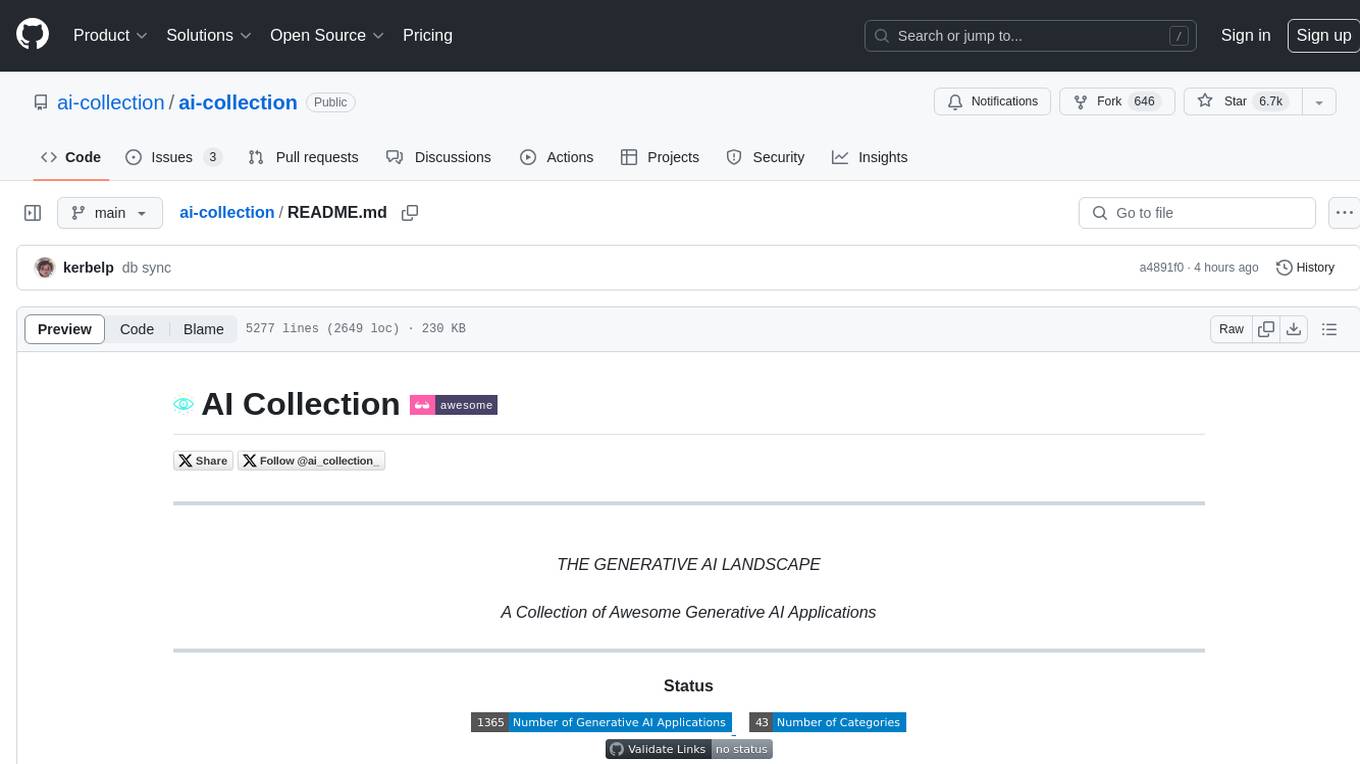Best AI tools for< straighten photos >
14 - AI tool Sites

Aftershoot
Aftershoot is an AI-powered culling and editing software designed to help photographers save time and improve their workflow. With Aftershoot, photographers can quickly cull their photos, identify the best shots, and apply professional-quality edits with just a few clicks. Aftershoot is compatible with both Windows and macOS, and it supports all major RAW and JPEG formats.

Imagen
Imagen is a personalized AI photo editing assistant solution designed for professional photographers. It offers a fast and efficient post-production process by learning and adapting to your personal editing style. The application provides consistent, accurate, and personalized editing in under 0.5 seconds per photo, with individual adjustments based on specific parameters. Imagen also features Personal AI Profiles that evolve and learn from user preferences, along with additional AI tools like Crop, Straighten, Subject Mask, and Smooth Skin. The platform empowers photographers with effortless culling, cloud storage backup, and access to Talent AI Profiles by leading international photographers.
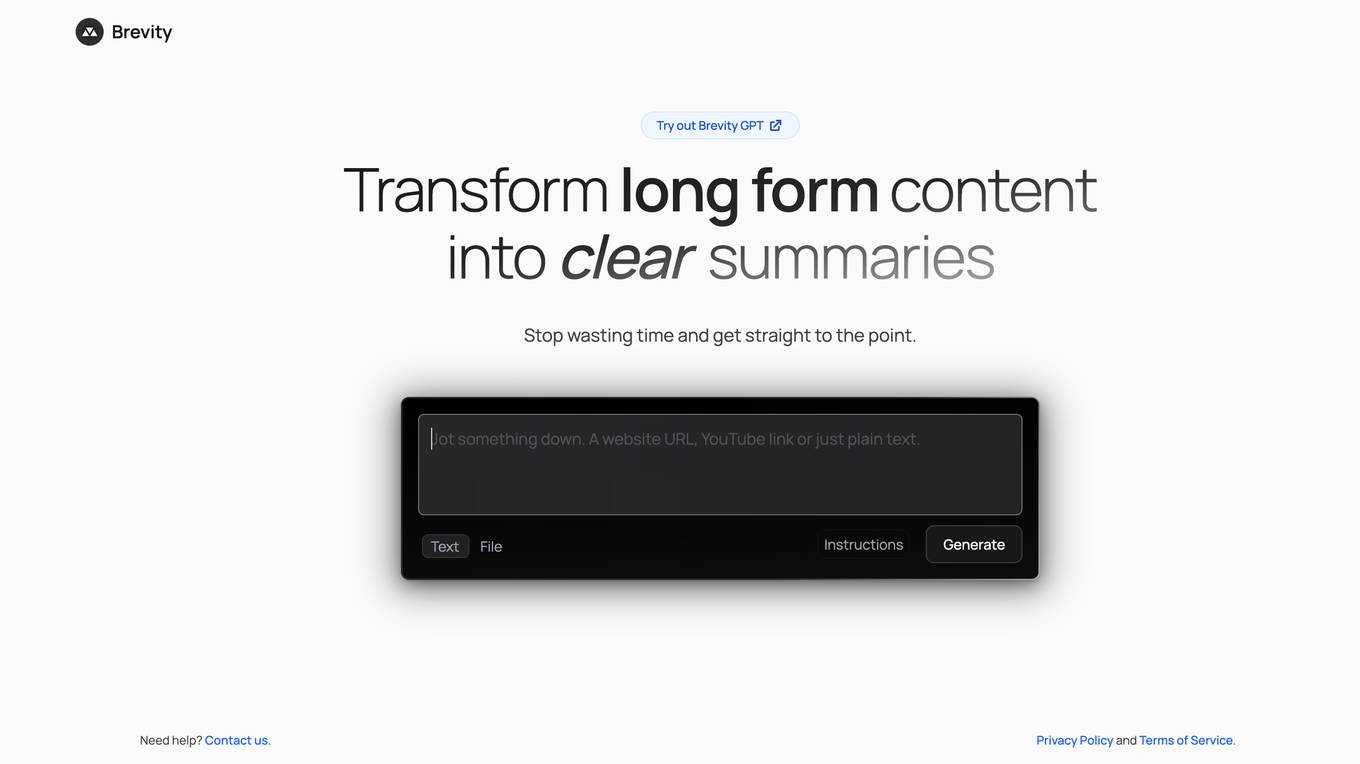
Brevity
Brevity is a tool that helps you summarize long pieces of text into shorter, more concise summaries. It uses artificial intelligence to identify the most important points in a text and then generates a summary that is both accurate and easy to read. Brevity is a great tool for anyone who needs to quickly get the gist of a long article, blog post, or other piece of writing.
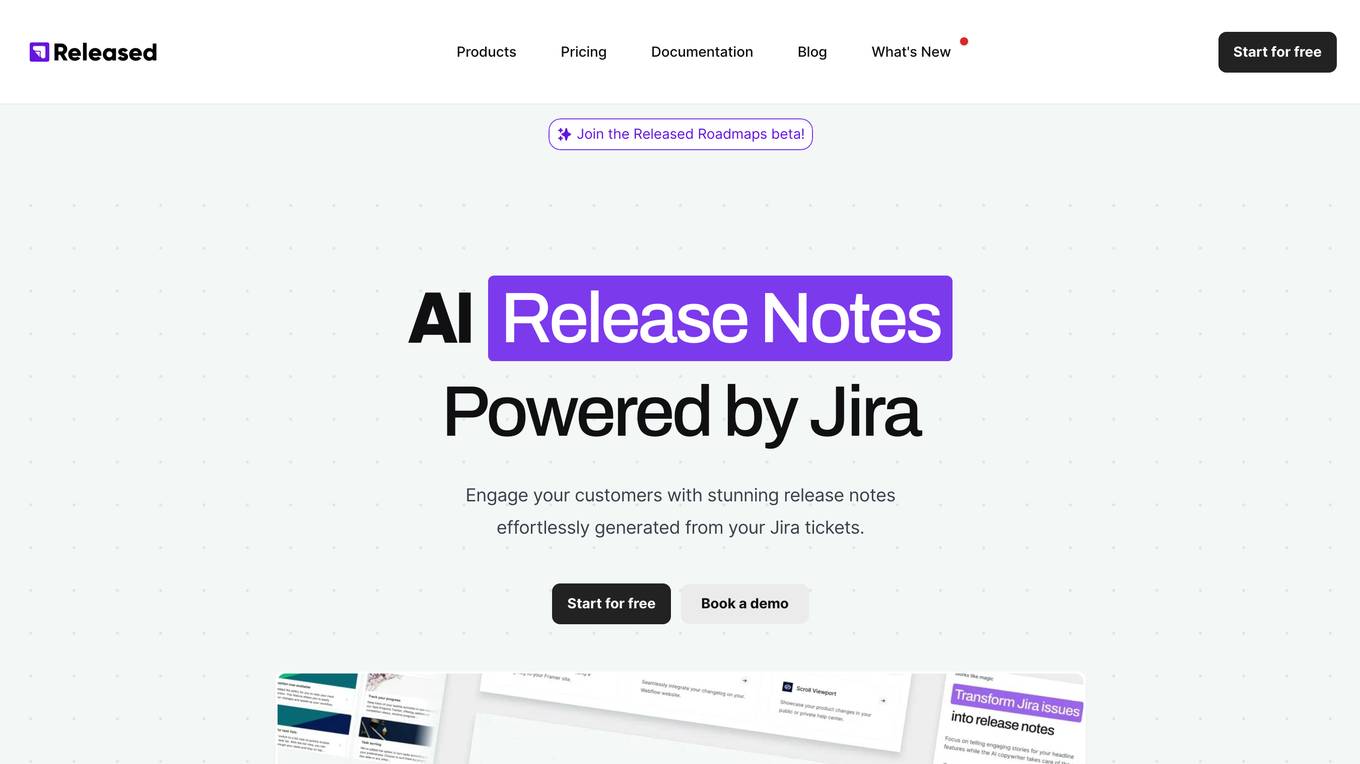
Released
Released is an AI-powered tool that helps you generate release notes and changelogs for your Jira products. It uses natural language processing to transform Jira issues into engaging release notes, saving you time and effort. Released also offers a variety of features to help you customize and publish your release notes, including custom prompts, post categorization, a WYSIWYG editor, rich content blocks, drag and drop functionality, issue filtering, and the ability to include issues from multiple Jira projects. With Released, you can easily share your release notes with your customers, team, and stakeholders through a variety of channels, including your website, in-app widget, Confluence, and Slack.
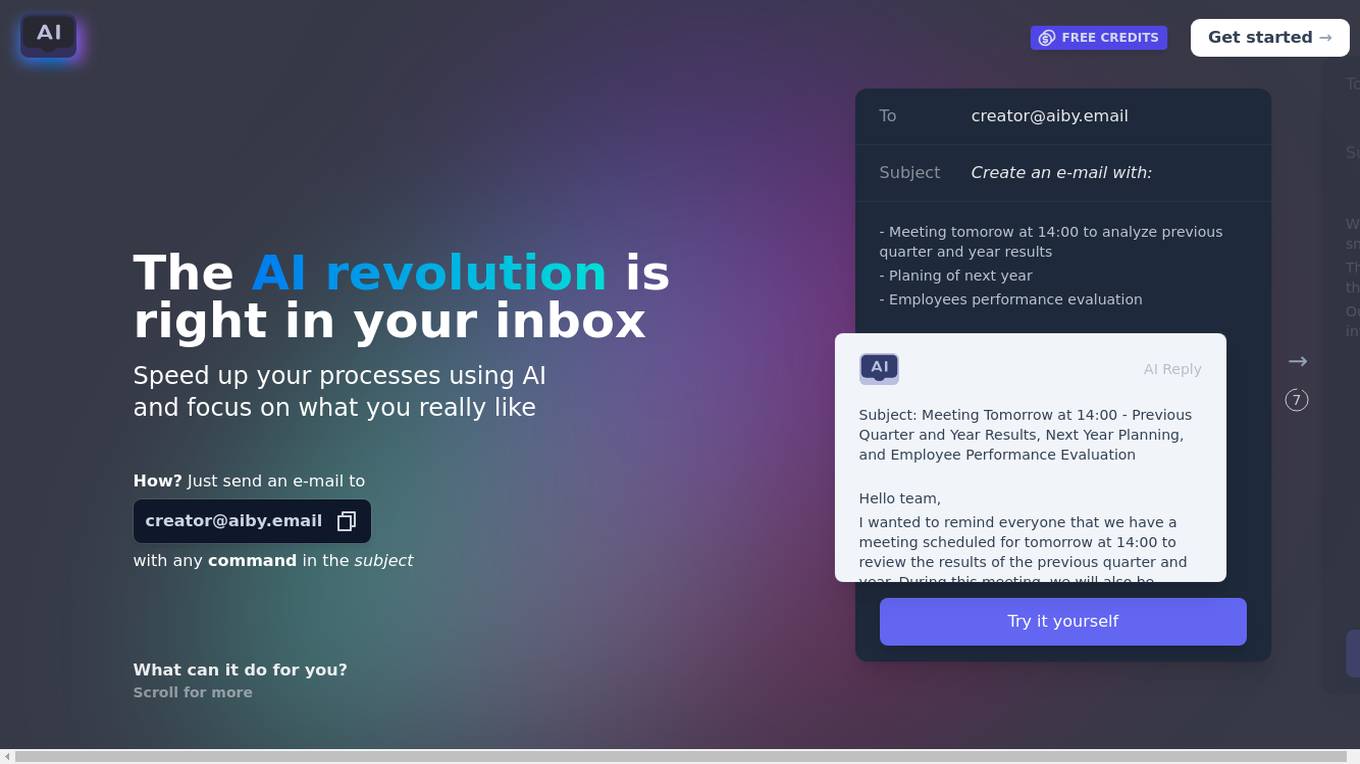
AIby.email
AIby.email is an AI-powered email assistant that helps you write better emails, faster. It uses natural language processing to understand your intent and generate personalized email responses. AIby.email also offers a variety of other features, such as email scheduling, tracking, and analytics.

Aiiot Talk
Aiiot Talk is an AI tool that focuses on Artificial Intelligence, Robotics, Technology, Internet of Things, Machine Learning, Business Technology, Data Security, and Marketing. The platform provides insights, articles, and discussions on the latest trends and applications of AI in various industries. Users can explore how AI is reshaping businesses, enhancing security measures, and revolutionizing technology. Aiiot Talk aims to educate and inform readers about the potential of AI and its impact on society and the future.
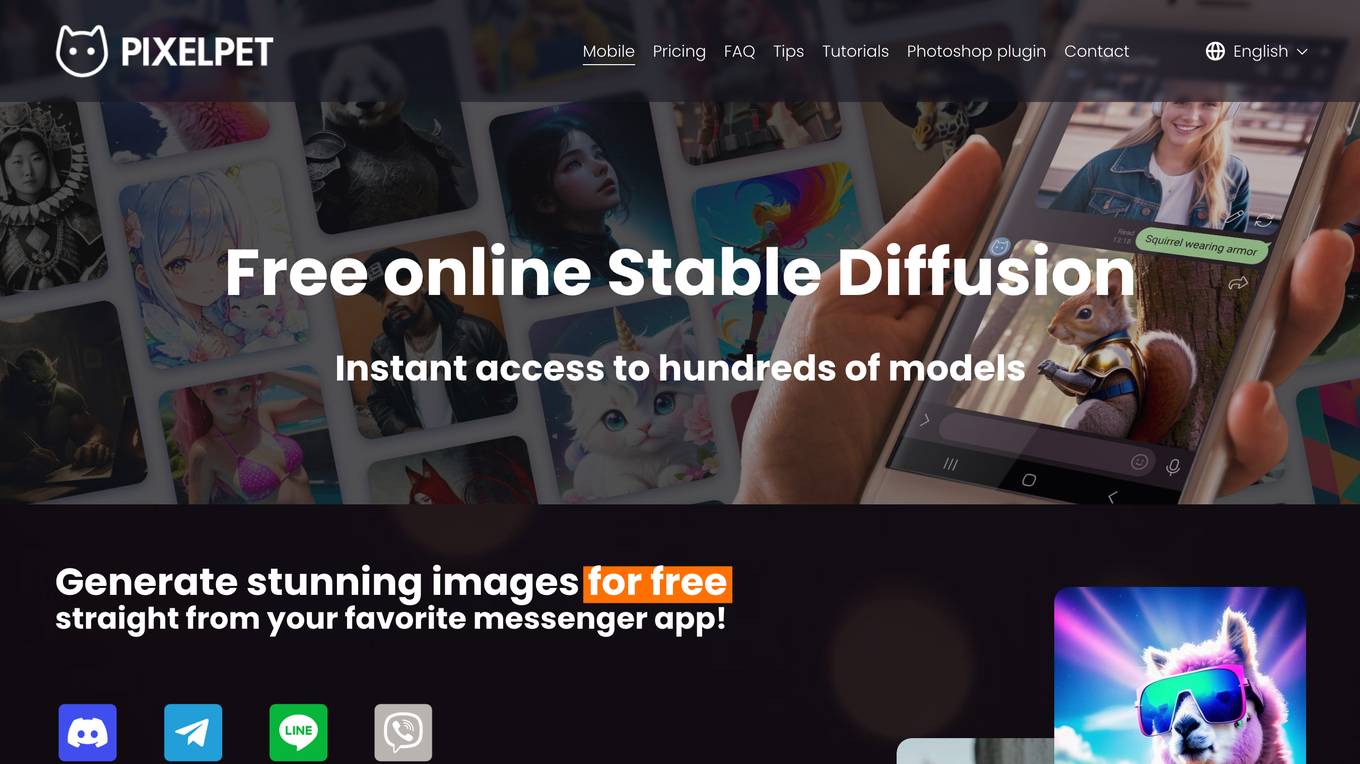
PixelPet
PixelPet is a free online Stable Diffusion tool that allows users to generate stunning images straight from their favorite messenger app. With instant access to hundreds of models, users can create hyper-realistic images in 1344x768px resolution. PixelPet also features auto translation for all languages, Prompt Magic to automatically boost prompts for awesome results, and is empowered by the latest Stable Diffusion models. Users can add the PixelPet bot to Telegram, LINE Messenger, or Discord to start generating images today.

SexpertAI
SexpertAI is an AI-powered chatbot that provides comprehensive and accurate information on sexual health and relationships. It is designed to help users make informed decisions about their sexual health and well-being. SexpertAI is trained on a massive dataset of sexual health information, including medical research, clinical guidelines, and expert opinions. This allows it to provide users with up-to-date and evidence-based information on a wide range of sexual health topics, including STIs, contraception, pregnancy, and sexual dysfunction.

NutshellPro
NutshellPro is an AI-powered tool that allows users to summarize any video or audio file. It uses advanced natural language processing and machine learning algorithms to extract the key points and generate a concise, easy-to-read summary. NutshellPro is designed to help users save time and effort by quickly getting the gist of any video or audio content.
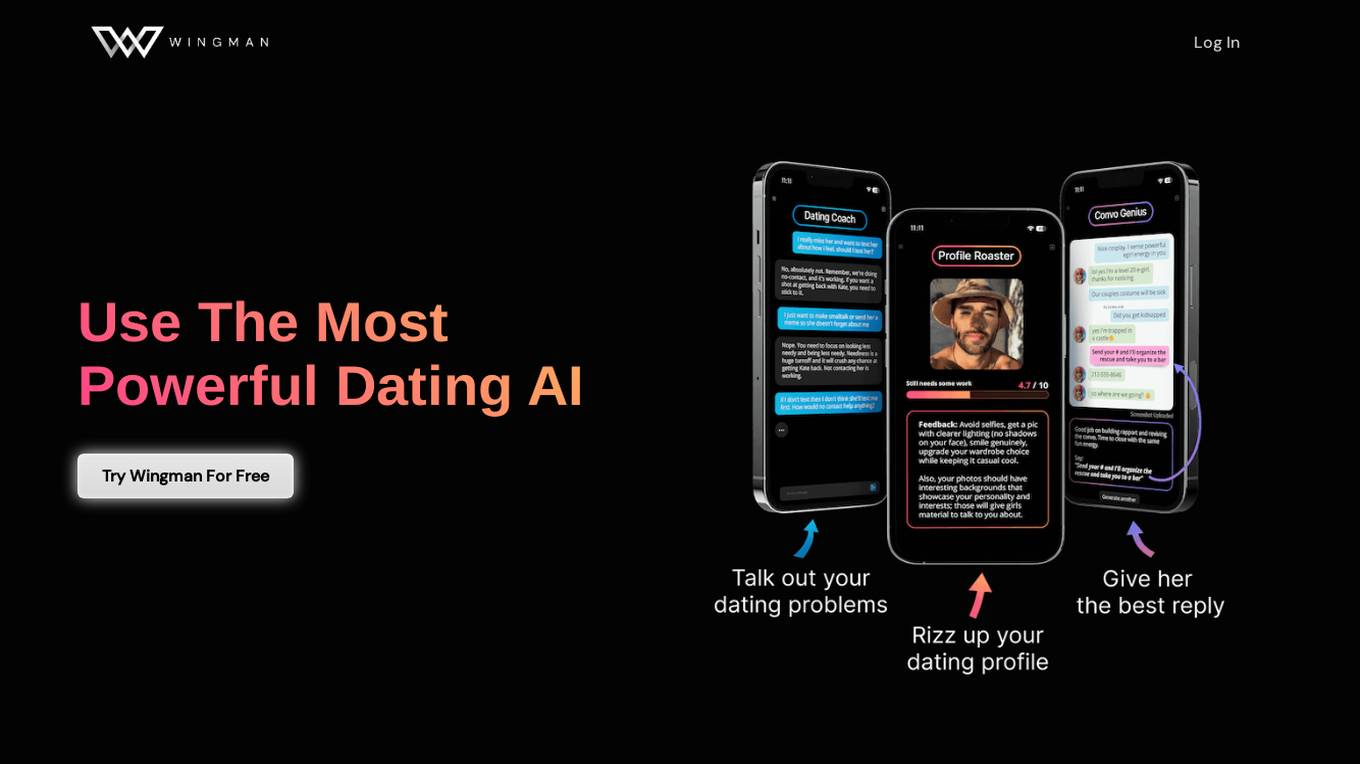
Wingman
Wingman is an AI dating coach application that offers personalized dating advice to straight men. It provides services such as chatbot coaching, profile optimization, and conversation feedback to help users improve their dating game and increase their chances of finding meaningful connections. Wingman prioritizes user privacy by ensuring all interactions are fully anonymized, and it continuously updates its memory bank to provide tailored advice. The application is currently in beta phase and offers complimentary access to invited users, with plans to introduce a free trial version upon official launch.
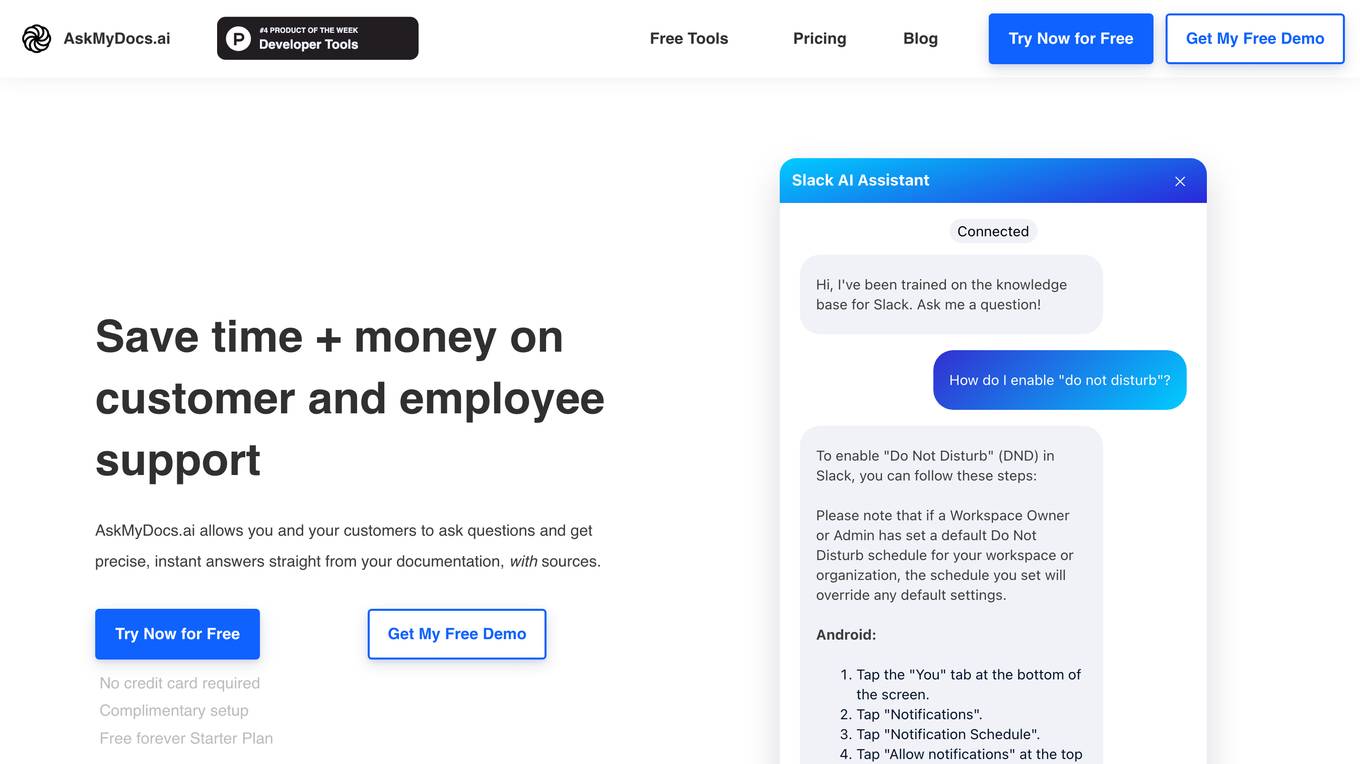
AskMyDocs.ai
AskMyDocs.ai is a powerful tool that allows you to ask questions and get precise, instant answers straight from your documentation, with sources. It can be used to save time and money on customer and employee support. AskMyDocs.ai offers a variety of features, including the ability to connect to your Zendesk knowledge base, Gitbook repository, Sitemap, PDF files, and Slack channels. It also offers a custom embedded chatbot and a variety of support options.
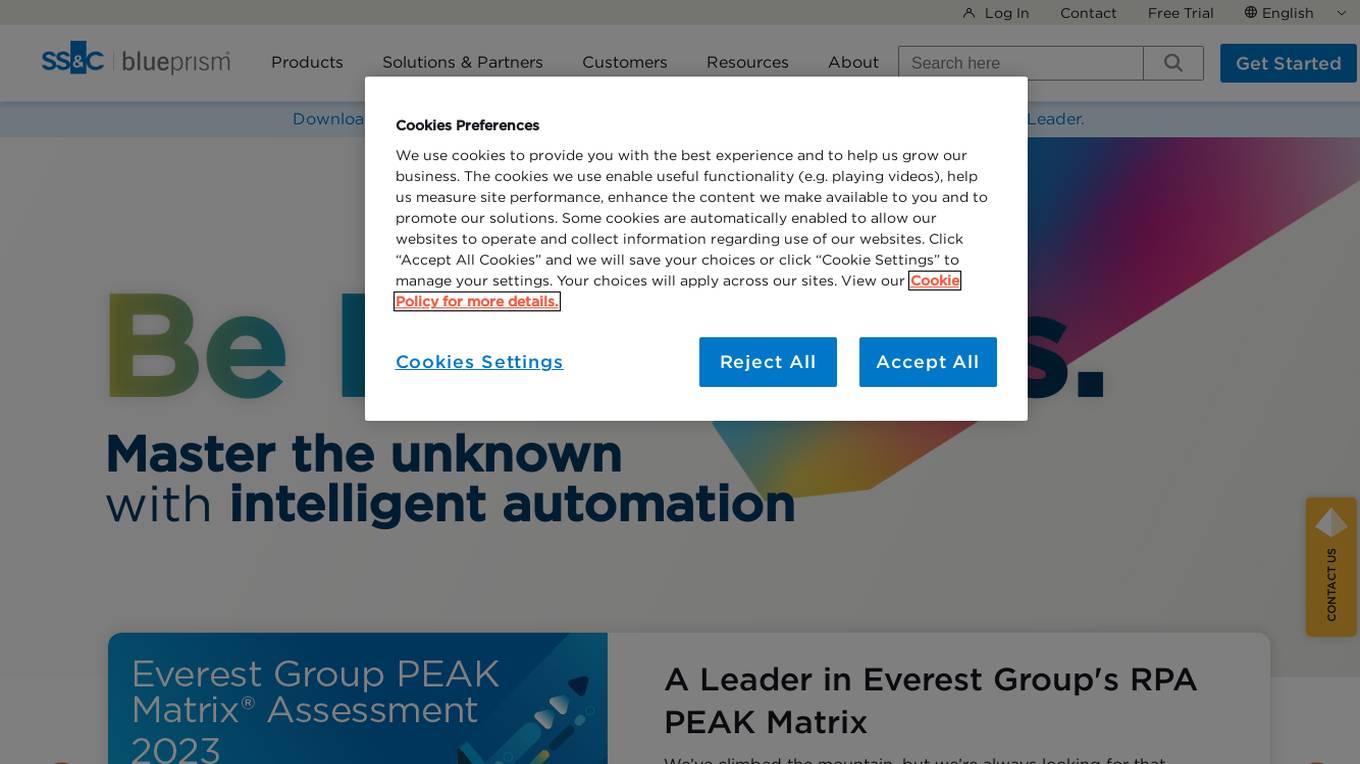
SS&C Blue Prism
SS&C Blue Prism is an intelligent automation platform that offers a comprehensive suite of tools for automating business processes. It leverages AI and machine learning to accelerate automation journeys, make human-like decisions, and extract data accurately from documents. The platform enables human and digital worker collaboration, accelerates straight-through processing, and integrates process automations rapidly. SS&C Blue Prism is designed to help organizations optimize operations, improve productivity, and enhance customer experiences through intelligent automation solutions.
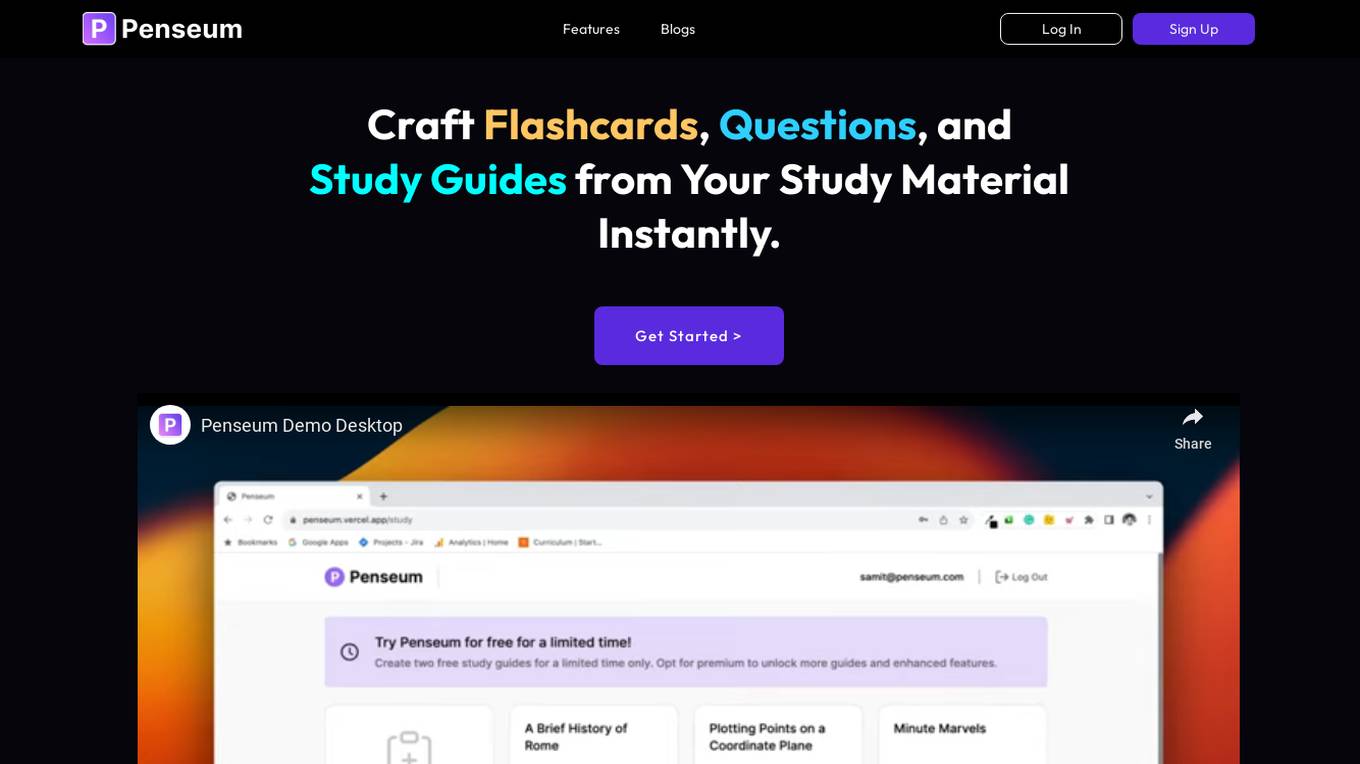
Penseum
Penseum is an AI-powered study partner that helps students learn more effectively. It can instantly transform notes, PDFs, videos, and PowerPoints into custom study guides, flashcards, questions & answers, and personalized AI chat. Penseum also provides a study roadmap to help students learn one step at a time. With Penseum, students can say goodbye to endless searching for questions and answers and dive straight into practicing. They can also connect with their own AI tutor and get answers at any time, even when their professor is unavailable. Penseum is the perfect study buddy for students who want to learn more efficiently and effectively.
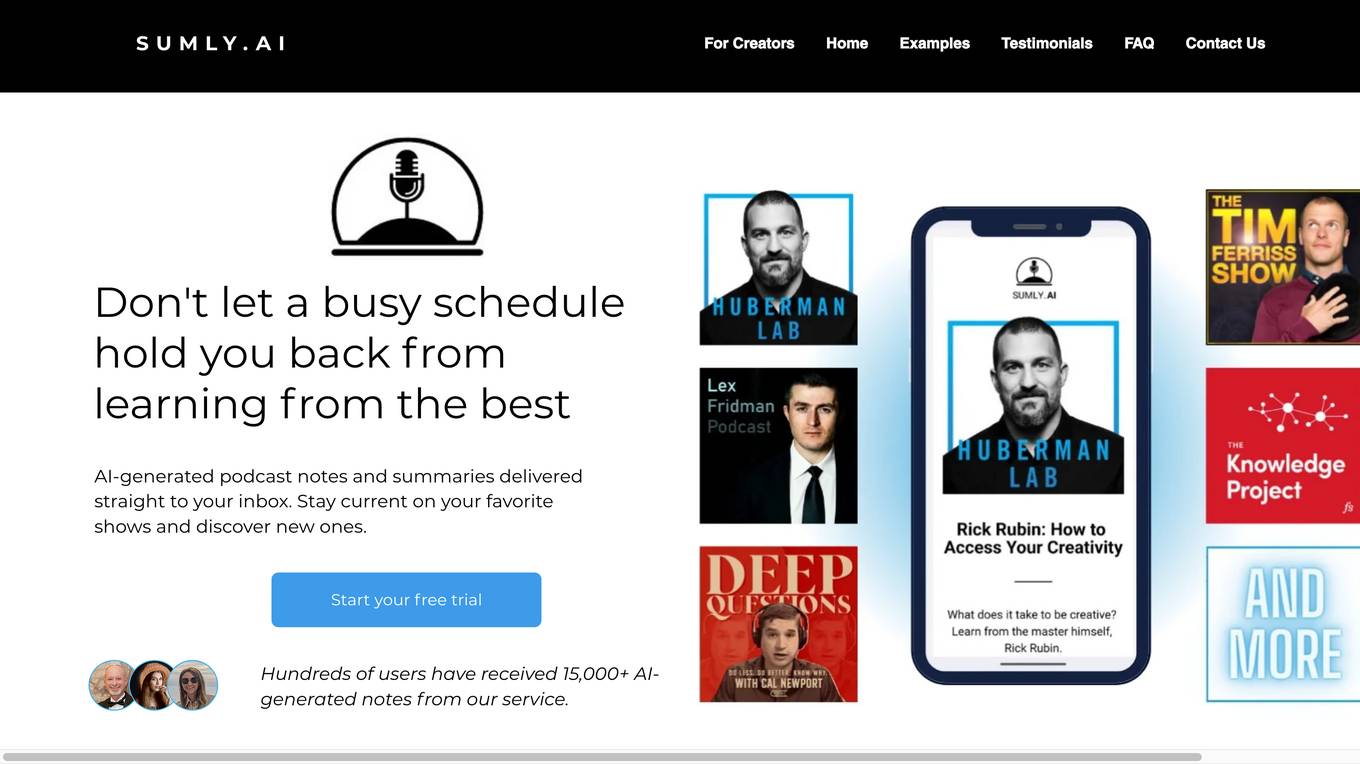
SumlyAI
SumlyAI is an AI-powered tool that generates podcast notes and summaries for busy individuals who want to stay current on their favorite shows and discover new ones. The service delivers high-quality notes created using the latest AI technology and reviewed by humans to ensure accuracy and relevance. Users can access a treasure trove of podcast summaries and receive AI-generated summaries straight to their inbox, making it easy to keep up with podcasts even with a busy schedule.
20 - Open Source AI Tools
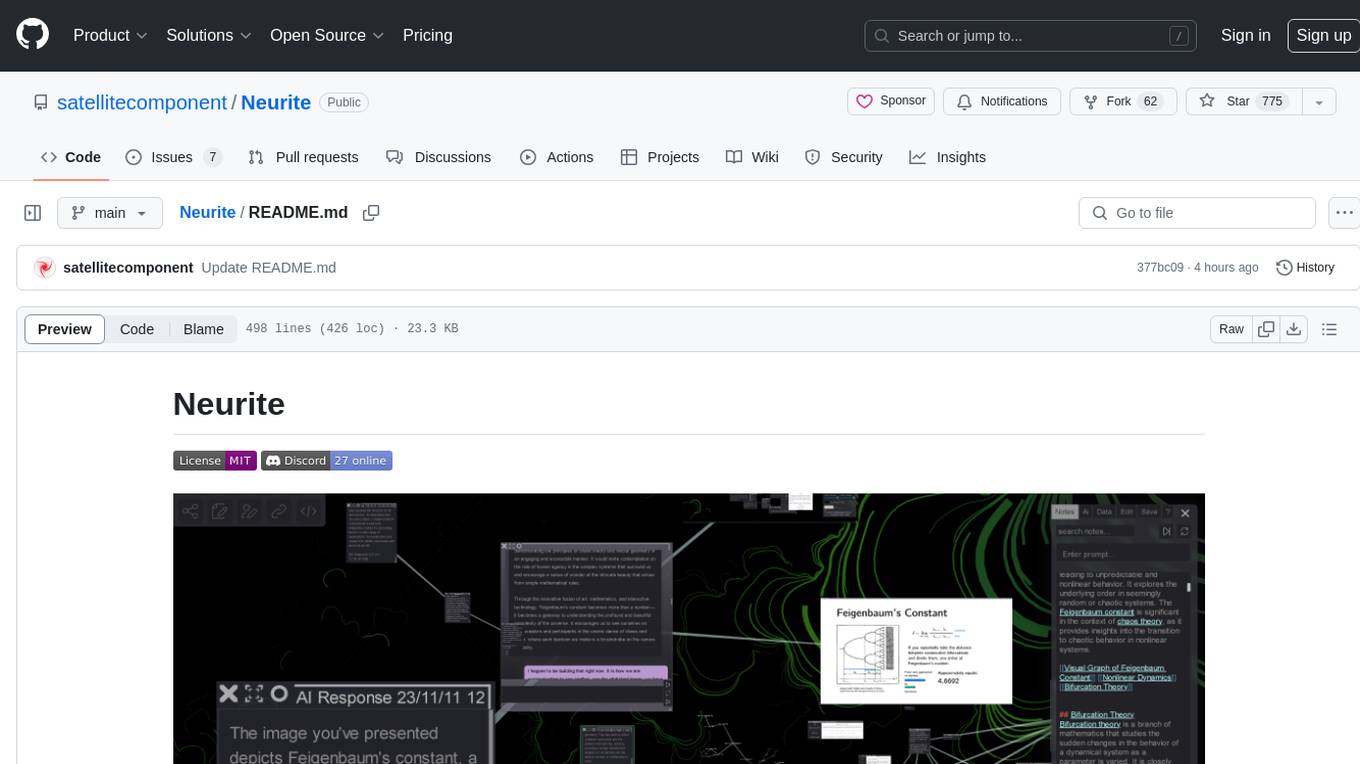
Neurite
Neurite is an innovative project that combines chaos theory and graph theory to create a digital interface that explores hidden patterns and connections for creative thinking. It offers a unique workspace blending fractals with mind mapping techniques, allowing users to navigate the Mandelbrot set in real-time. Nodes in Neurite represent various content types like text, images, videos, code, and AI agents, enabling users to create personalized microcosms of thoughts and inspirations. The tool supports synchronized knowledge management through bi-directional synchronization between mind-mapping and text-based hyperlinking. Neurite also features FractalGPT for modular conversation with AI, local AI capabilities for multi-agent chat networks, and a Neural API for executing code and sequencing animations. The project is actively developed with plans for deeper fractal zoom, advanced control over node placement, and experimental features.
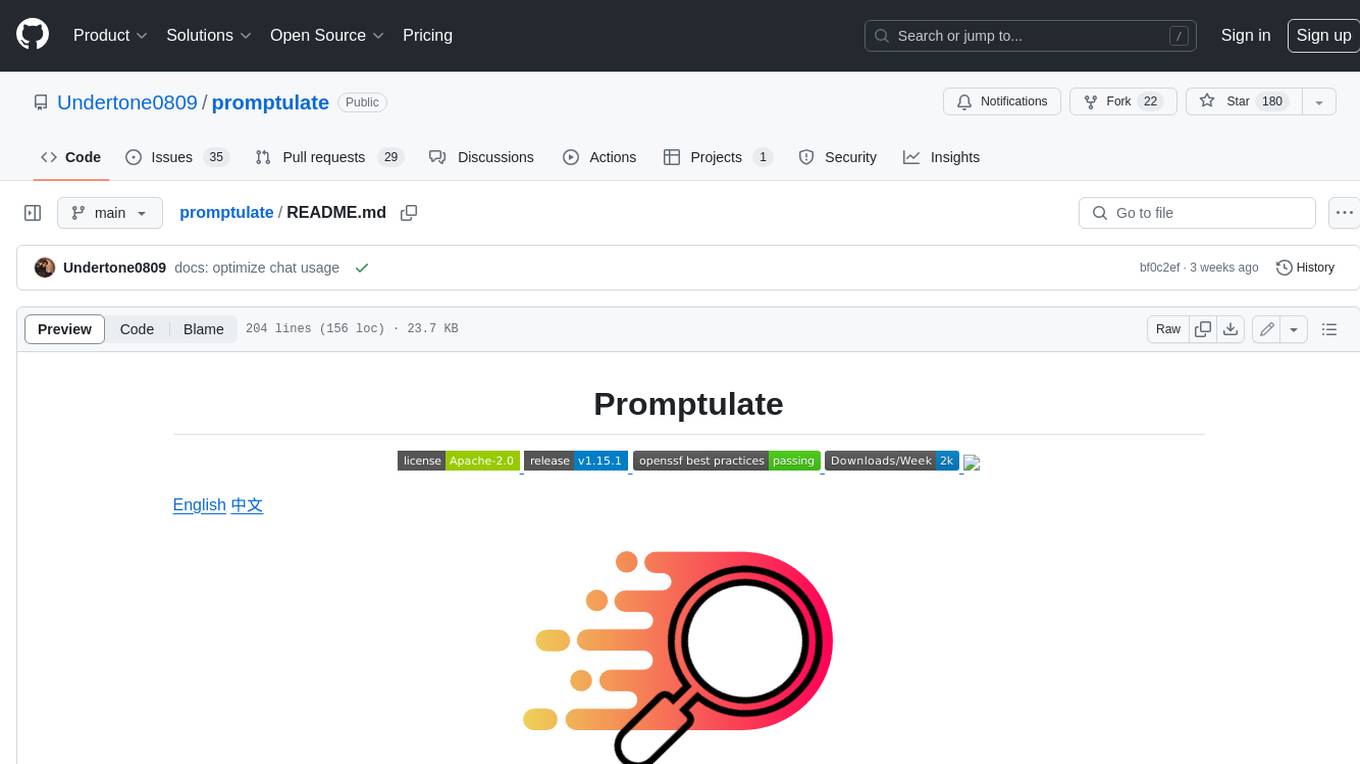
promptulate
**Promptulate** is an AI Agent application development framework crafted by **Cogit Lab** , which offers developers an extremely concise and efficient way to build Agent applications through a Pythonic development paradigm. The core philosophy of Promptulate is to borrow and integrate the wisdom of the open-source community, incorporating the highlights of various development frameworks to lower the barrier to entry and unify the consensus among developers. With Promptulate, you can manipulate components like LLM, Agent, Tool, RAG, etc., with the most succinct code, as most tasks can be easily completed with just a few lines of code. 🚀
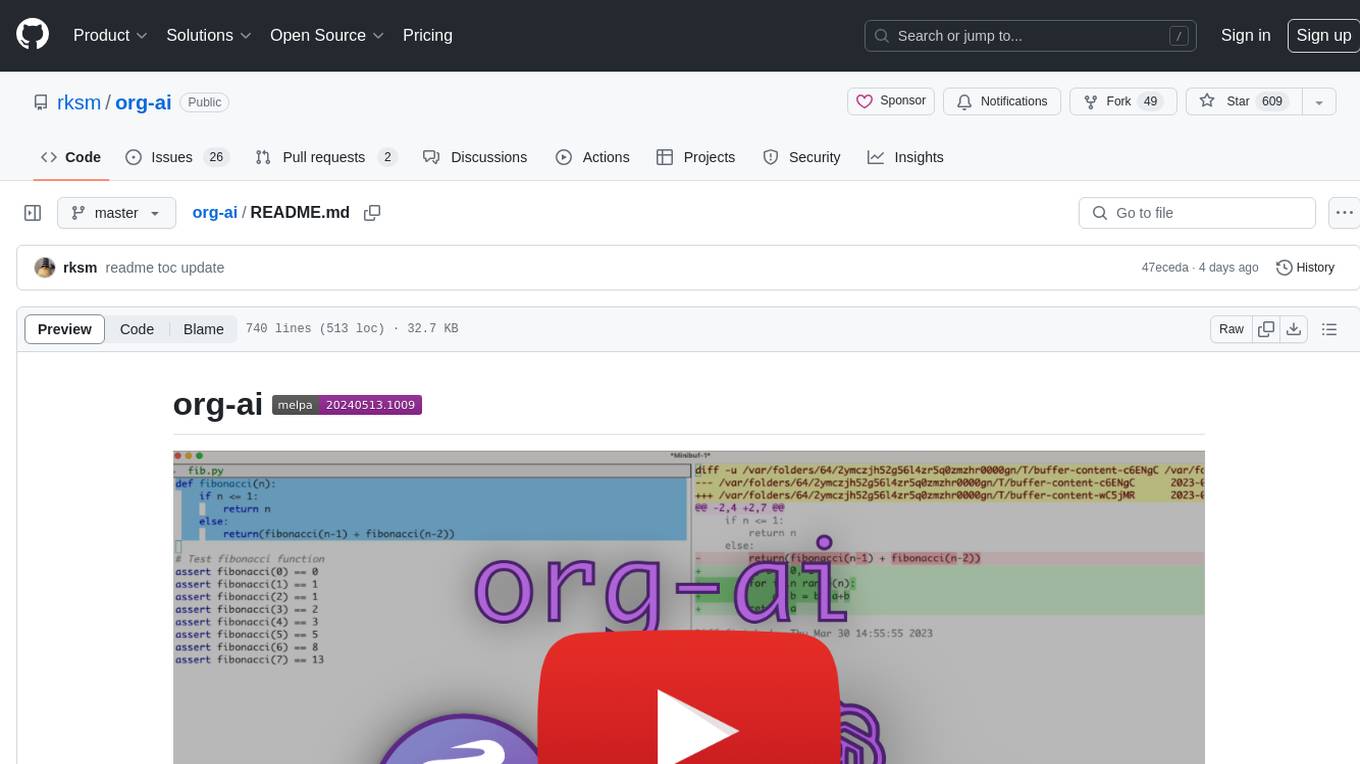
org-ai
org-ai is a minor mode for Emacs org-mode that provides access to generative AI models, including OpenAI API (ChatGPT, DALL-E, other text models) and Stable Diffusion. Users can use ChatGPT to generate text, have speech input and output interactions with AI, generate images and image variations using Stable Diffusion or DALL-E, and use various commands outside org-mode for prompting using selected text or multiple files. The tool supports syntax highlighting in AI blocks, auto-fill paragraphs on insertion, and offers block options for ChatGPT, DALL-E, and other text models. Users can also generate image variations, use global commands, and benefit from Noweb support for named source blocks.
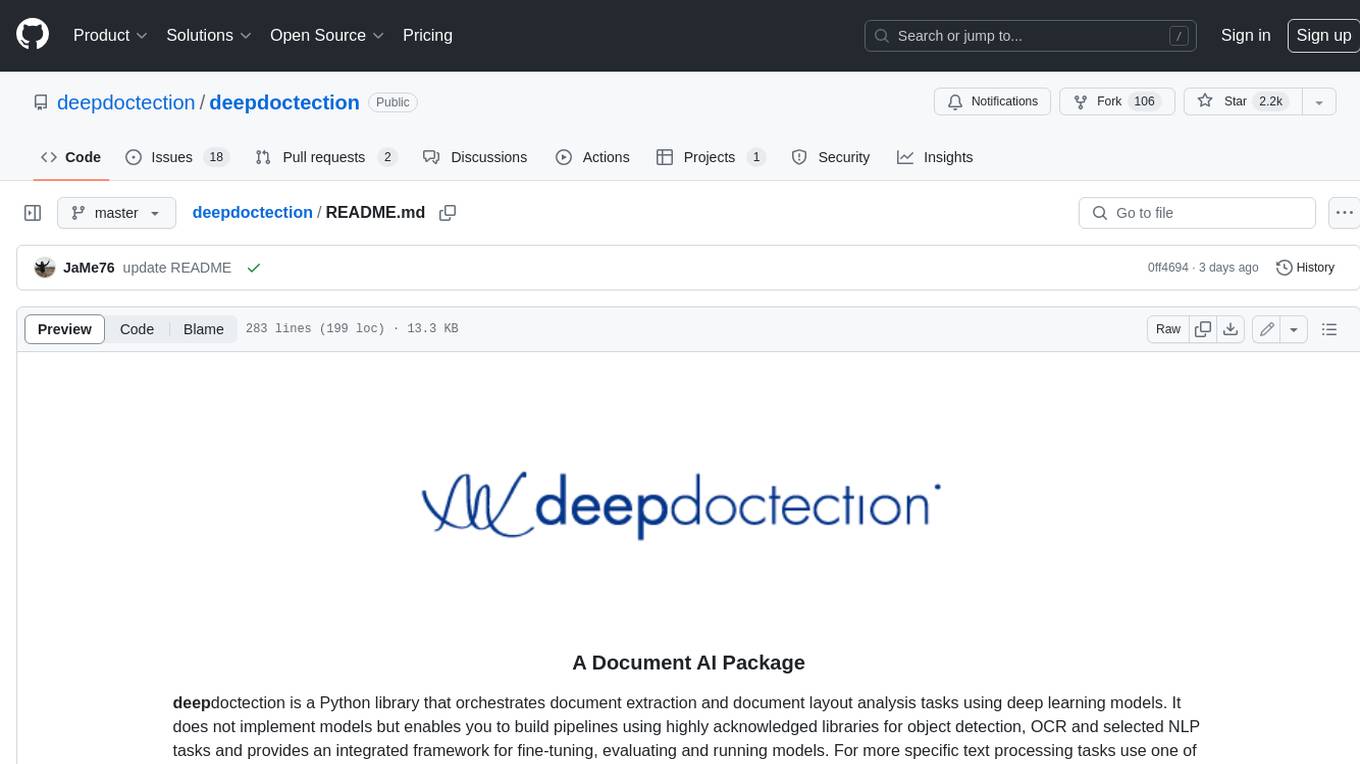
deepdoctection
**deep** doctection is a Python library that orchestrates document extraction and document layout analysis tasks using deep learning models. It does not implement models but enables you to build pipelines using highly acknowledged libraries for object detection, OCR and selected NLP tasks and provides an integrated framework for fine-tuning, evaluating and running models. For more specific text processing tasks use one of the many other great NLP libraries. **deep** doctection focuses on applications and is made for those who want to solve real world problems related to document extraction from PDFs or scans in various image formats. **deep** doctection provides model wrappers of supported libraries for various tasks to be integrated into pipelines. Its core function does not depend on any specific deep learning library. Selected models for the following tasks are currently supported: * Document layout analysis including table recognition in Tensorflow with **Tensorpack**, or PyTorch with **Detectron2**, * OCR with support of **Tesseract**, **DocTr** (Tensorflow and PyTorch implementations available) and a wrapper to an API for a commercial solution, * Text mining for native PDFs with **pdfplumber**, * Language detection with **fastText**, * Deskewing and rotating images with **jdeskew**. * Document and token classification with all LayoutLM models provided by the **Transformer library**. (Yes, you can use any LayoutLM-model with any of the provided OCR-or pdfplumber tools straight away!). * Table detection and table structure recognition with **table-transformer**. * There is a small dataset for token classification available and a lot of new tutorials to show, how to train and evaluate this dataset using LayoutLMv1, LayoutLMv2, LayoutXLM and LayoutLMv3. * Comprehensive configuration of **analyzer** like choosing different models, output parsing, OCR selection. Check this notebook or the docs for more infos. * Document layout analysis and table recognition now runs with **Torchscript** (CPU) as well and **Detectron2** is not required anymore for basic inference. * [**new**] More angle predictors for determining the rotation of a document based on **Tesseract** and **DocTr** (not contained in the built-in Analyzer). * [**new**] Token classification with **LiLT** via **transformers**. We have added a model wrapper for token classification with LiLT and added a some LiLT models to the model catalog that seem to look promising, especially if you want to train a model on non-english data. The training script for LayoutLM can be used for LiLT as well and we will be providing a notebook on how to train a model on a custom dataset soon. **deep** doctection provides on top of that methods for pre-processing inputs to models like cropping or resizing and to post-process results, like validating duplicate outputs, relating words to detected layout segments or ordering words into contiguous text. You will get an output in JSON format that you can customize even further by yourself. Have a look at the **introduction notebook** in the notebook repo for an easy start. Check the **release notes** for recent updates. **deep** doctection or its support libraries provide pre-trained models that are in most of the cases available at the **Hugging Face Model Hub** or that will be automatically downloaded once requested. For instance, you can find pre-trained object detection models from the Tensorpack or Detectron2 framework for coarse layout analysis, table cell detection and table recognition. Training is a substantial part to get pipelines ready on some specific domain, let it be document layout analysis, document classification or NER. **deep** doctection provides training scripts for models that are based on trainers developed from the library that hosts the model code. Moreover, **deep** doctection hosts code to some well established datasets like **Publaynet** that makes it easy to experiment. It also contains mappings from widely used data formats like COCO and it has a dataset framework (akin to **datasets** so that setting up training on a custom dataset becomes very easy. **This notebook** shows you how to do this. **deep** doctection comes equipped with a framework that allows you to evaluate predictions of a single or multiple models in a pipeline against some ground truth. Check again **here** how it is done. Having set up a pipeline it takes you a few lines of code to instantiate the pipeline and after a for loop all pages will be processed through the pipeline.
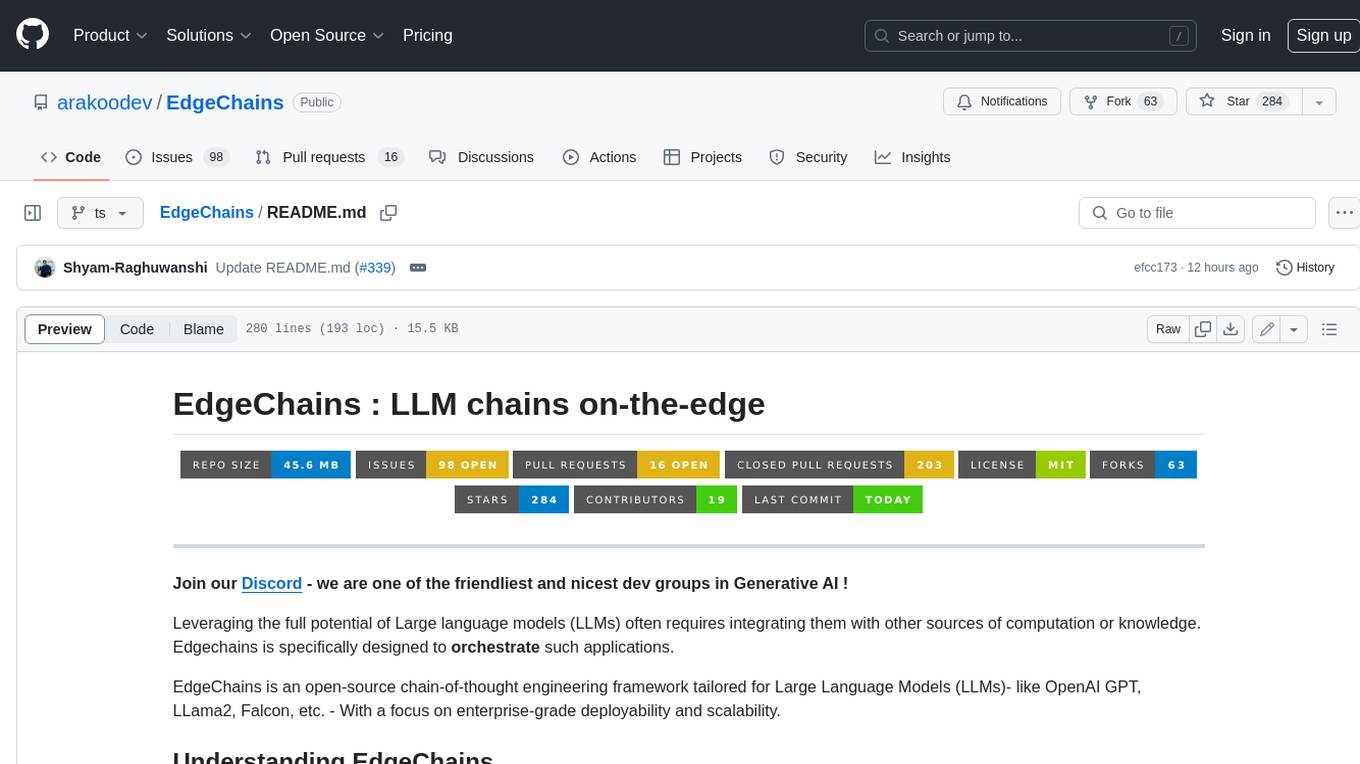
EdgeChains
EdgeChains is an open-source chain-of-thought engineering framework tailored for Large Language Models (LLMs)- like OpenAI GPT, LLama2, Falcon, etc. - With a focus on enterprise-grade deployability and scalability. EdgeChains is specifically designed to **orchestrate** such applications. At EdgeChains, we take a unique approach to Generative AI - we think Generative AI is a deployment and configuration management challenge rather than a UI and library design pattern challenge. We build on top of a tech that has solved this problem in a different domain - Kubernetes Config Management - and bring that to Generative AI. Edgechains is built on top of jsonnet, originally built by Google based on their experience managing a vast amount of configuration code in the Borg infrastructure.
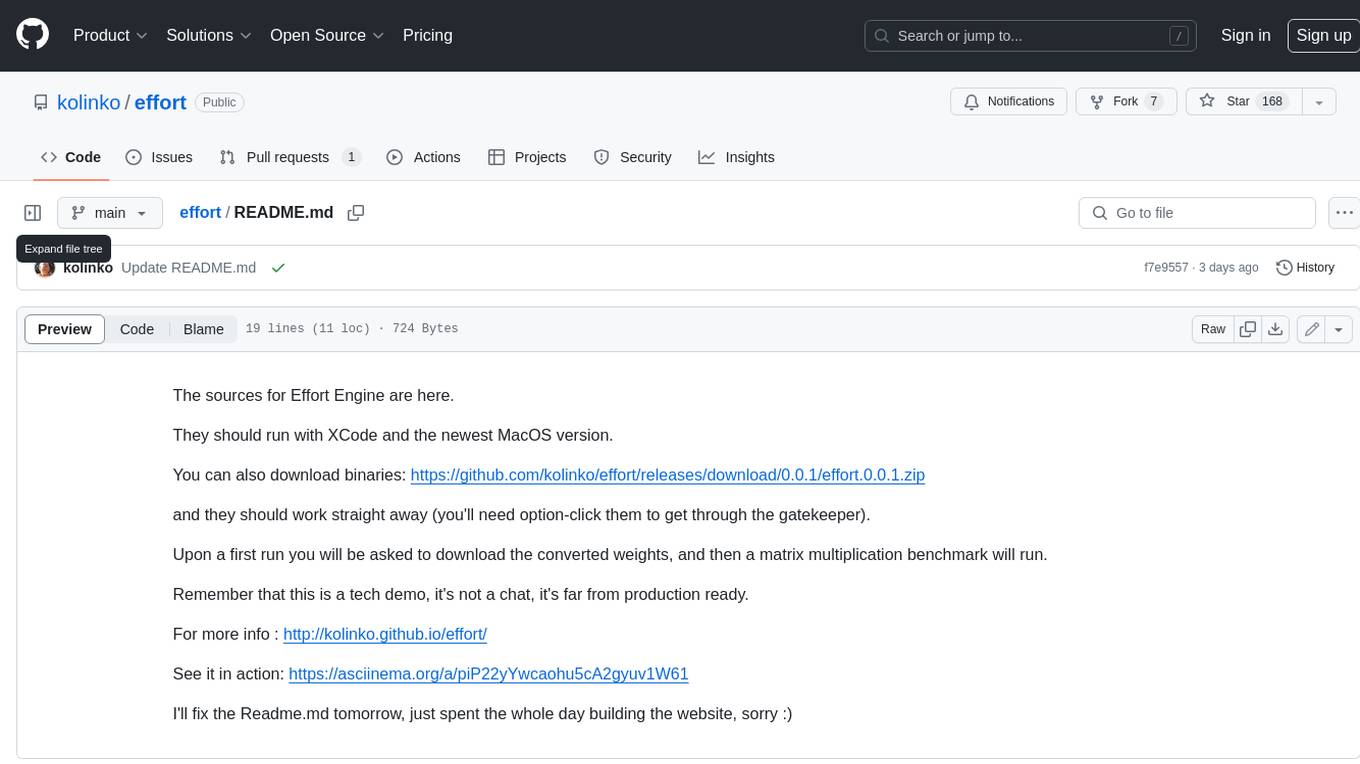
effort
Effort is an example implementation of the bucketMul algorithm, which allows for real-time adjustment of the number of calculations performed during inference of an LLM model. At 50% effort, it performs as fast as regular matrix multiplications on Apple Silicon chips; at 25% effort, it is twice as fast while still retaining most of the quality. Additionally, users have the option to skip loading the least important weights.
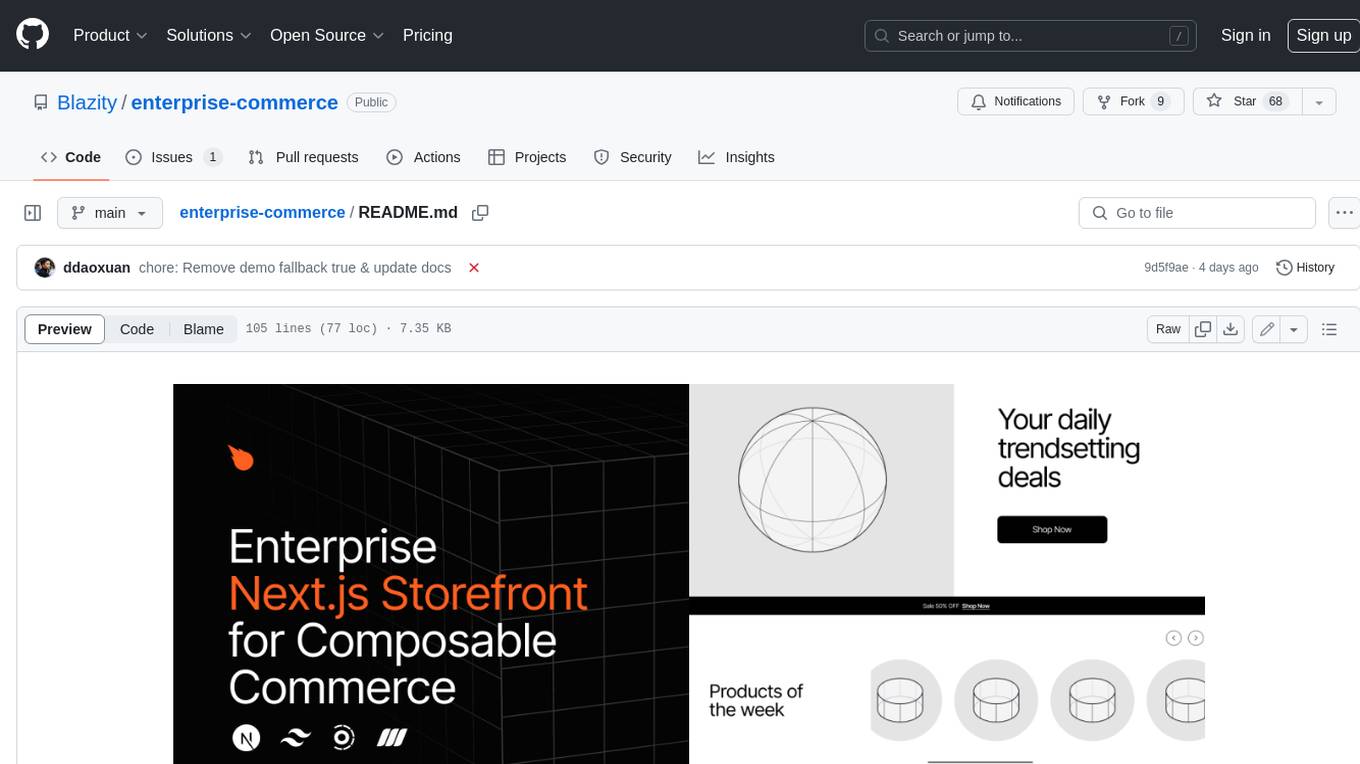
enterprise-commerce
Enterprise Commerce is a Next.js commerce starter that helps you launch your high-performance Shopify storefront in minutes, not weeks. It leverages the power of Vector Search and AI to deliver a superior online shopping experience without the development headaches.
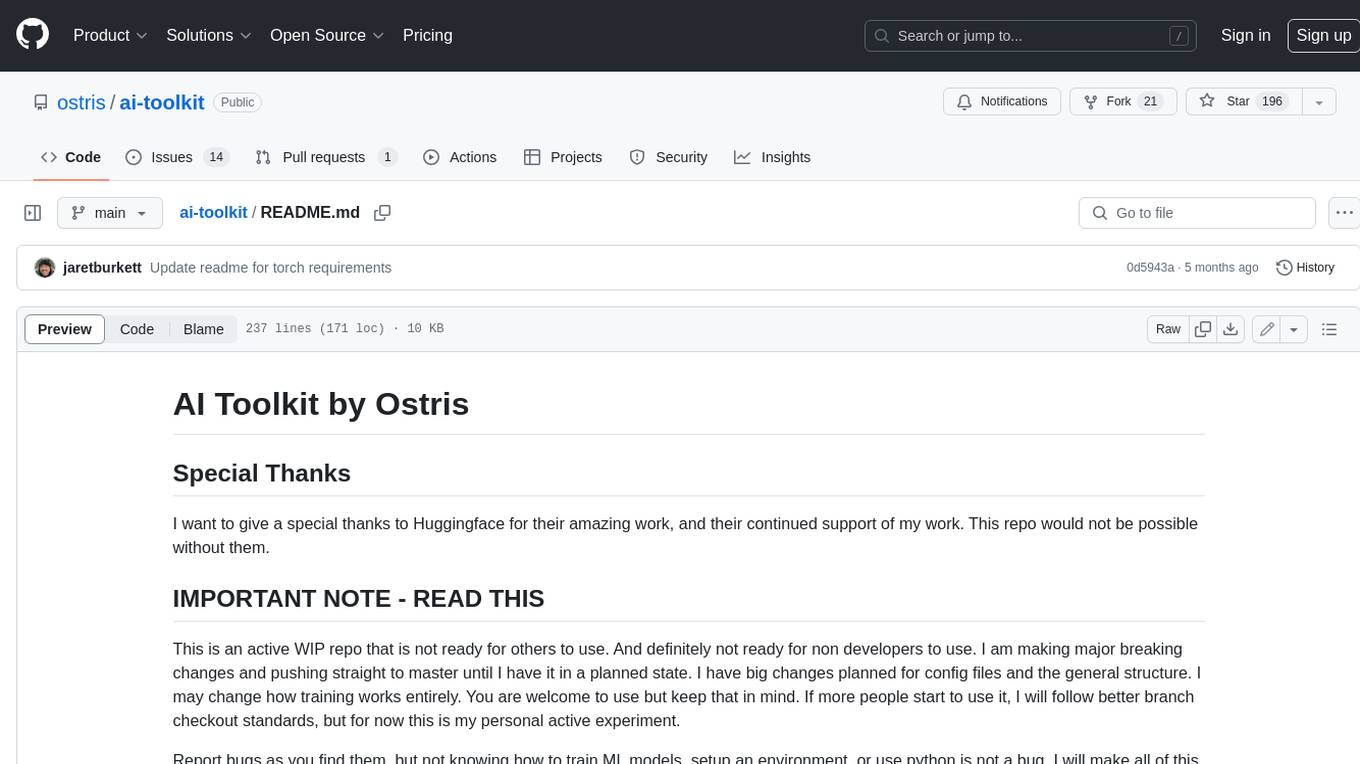
ai-toolkit
The AI Toolkit by Ostris is a collection of tools for machine learning, specifically designed for image generation, LoRA (latent representations of attributes) extraction and manipulation, and model training. It provides a user-friendly interface and extensive documentation to make it accessible to both developers and non-developers. The toolkit is actively under development, with new features and improvements being added regularly. Some of the key features of the AI Toolkit include: - Batch Image Generation: Allows users to generate a batch of images based on prompts or text files, using a configuration file to specify the desired settings. - LoRA (lierla), LoCON (LyCORIS) Extractor: Facilitates the extraction of LoRA and LoCON representations from pre-trained models, enabling users to modify and manipulate these representations for various purposes. - LoRA Rescale: Provides a tool to rescale LoRA weights, allowing users to adjust the influence of specific attributes in the generated images. - LoRA Slider Trainer: Enables the training of LoRA sliders, which can be used to control and adjust specific attributes in the generated images, offering a powerful tool for fine-tuning and customization. - Extensions: Supports the creation and sharing of custom extensions, allowing users to extend the functionality of the toolkit with their own tools and scripts. - VAE (Variational Auto Encoder) Trainer: Facilitates the training of VAEs for image generation, providing users with a tool to explore and improve the quality of generated images. The AI Toolkit is a valuable resource for anyone interested in exploring and utilizing machine learning for image generation and manipulation. Its user-friendly interface, extensive documentation, and active development make it an accessible and powerful tool for both beginners and experienced users.
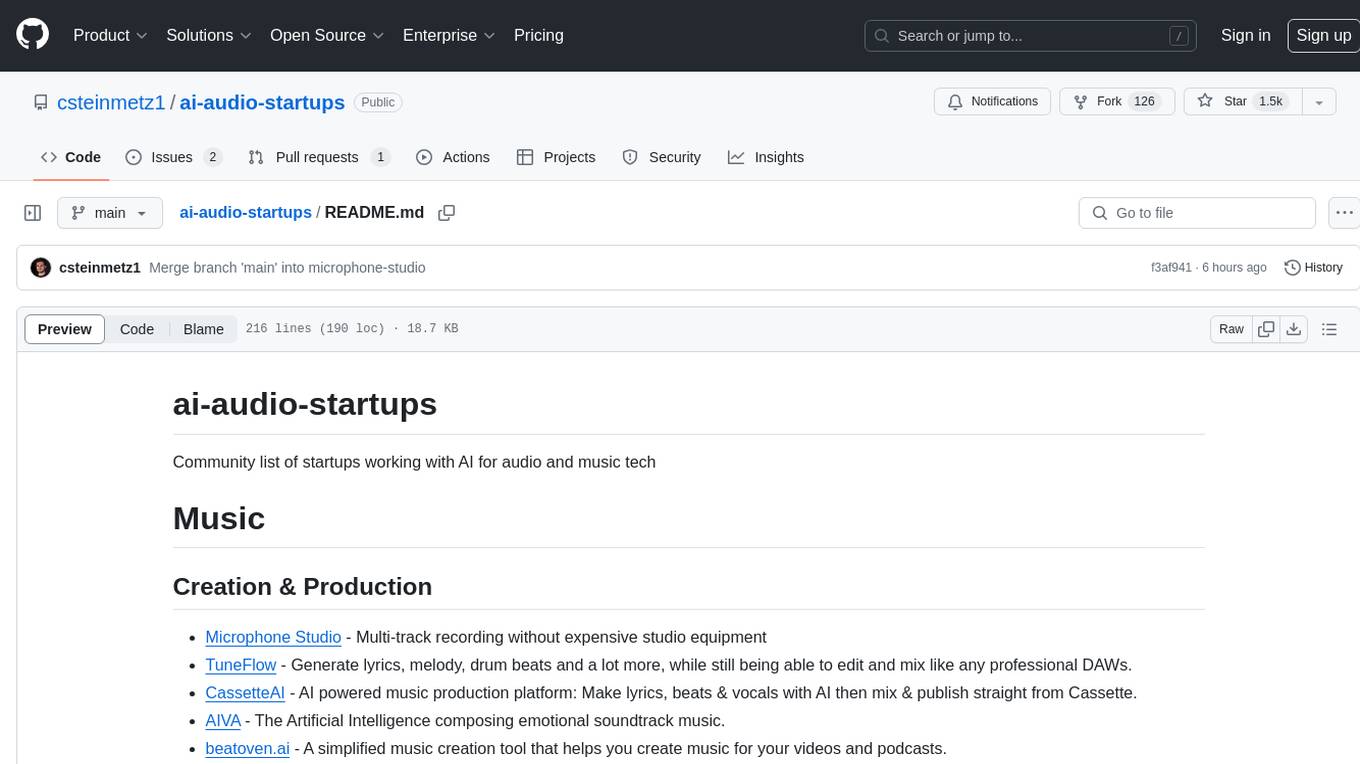
ai-audio-startups
The 'ai-audio-startups' repository is a community list of startups working with AI for audio and music tech. It includes a comprehensive collection of tools and platforms that leverage artificial intelligence to enhance various aspects of music creation, production, source separation, analysis, recommendation, health & wellbeing, radio/podcast, hearing, sound detection, speech transcription, synthesis, enhancement, and manipulation. The repository serves as a valuable resource for individuals interested in exploring innovative AI applications in the audio and music industry.
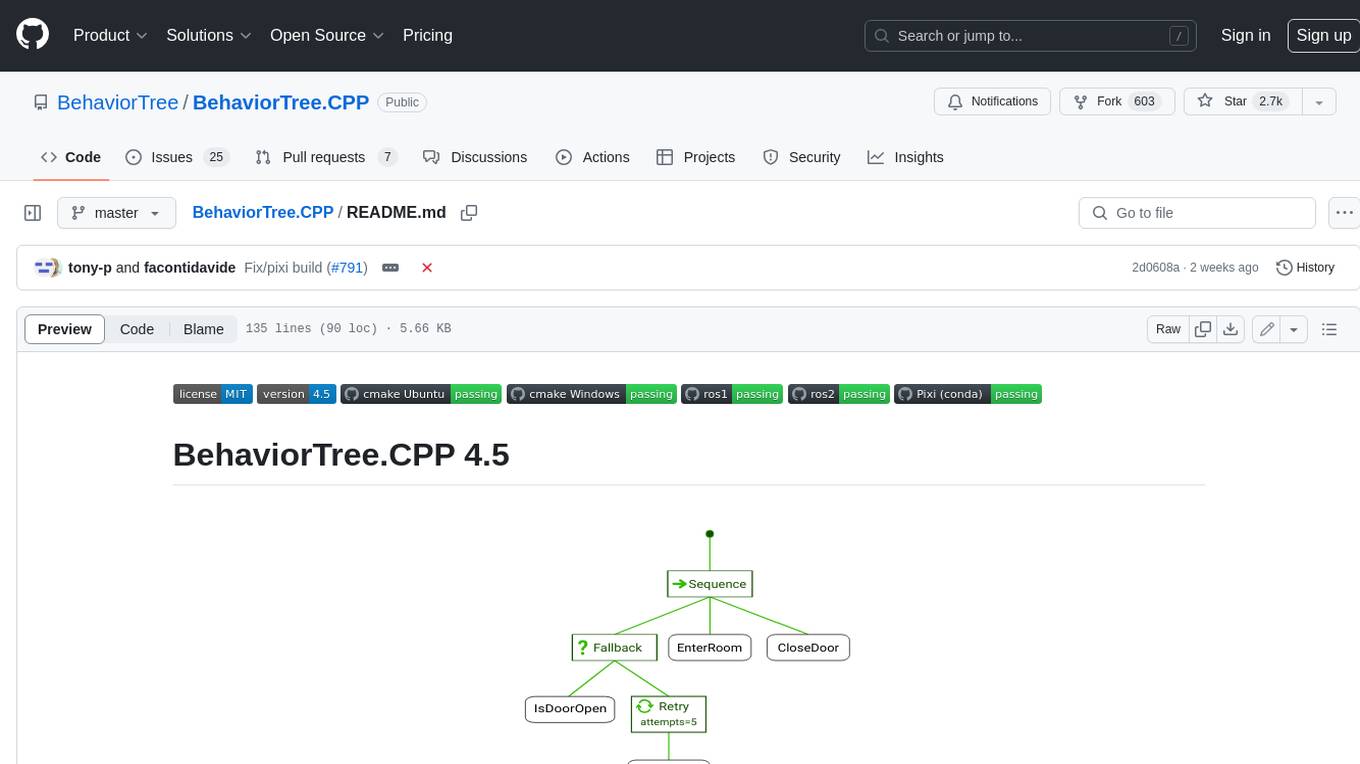
BehaviorTree.CPP
BehaviorTree.CPP is a C++ 17 library that provides a framework to create BehaviorTrees. It was designed to be flexible, easy to use, reactive and fast. Even if our main use-case is robotics, you can use this library to build AI for games, or to replace Finite State Machines. There are few features which make BehaviorTree.CPP unique, when compared to other implementations: It makes asynchronous Actions, i.e. non-blocking, a first-class citizen. You can build reactive behaviors that execute multiple Actions concurrently (orthogonality). Trees are defined using a Domain Specific scripting language (based on XML), and can be loaded at run-time; in other words, even if written in C++, the morphology of the Trees is not hard-coded. You can statically link your custom TreeNodes or convert them into plugins and load them at run-time. It provides a type-safe and flexible mechanism to do Dataflow between Nodes of the Tree. It includes a logging/profiling infrastructure that allows the user to visualize, record, replay and analyze state transitions.
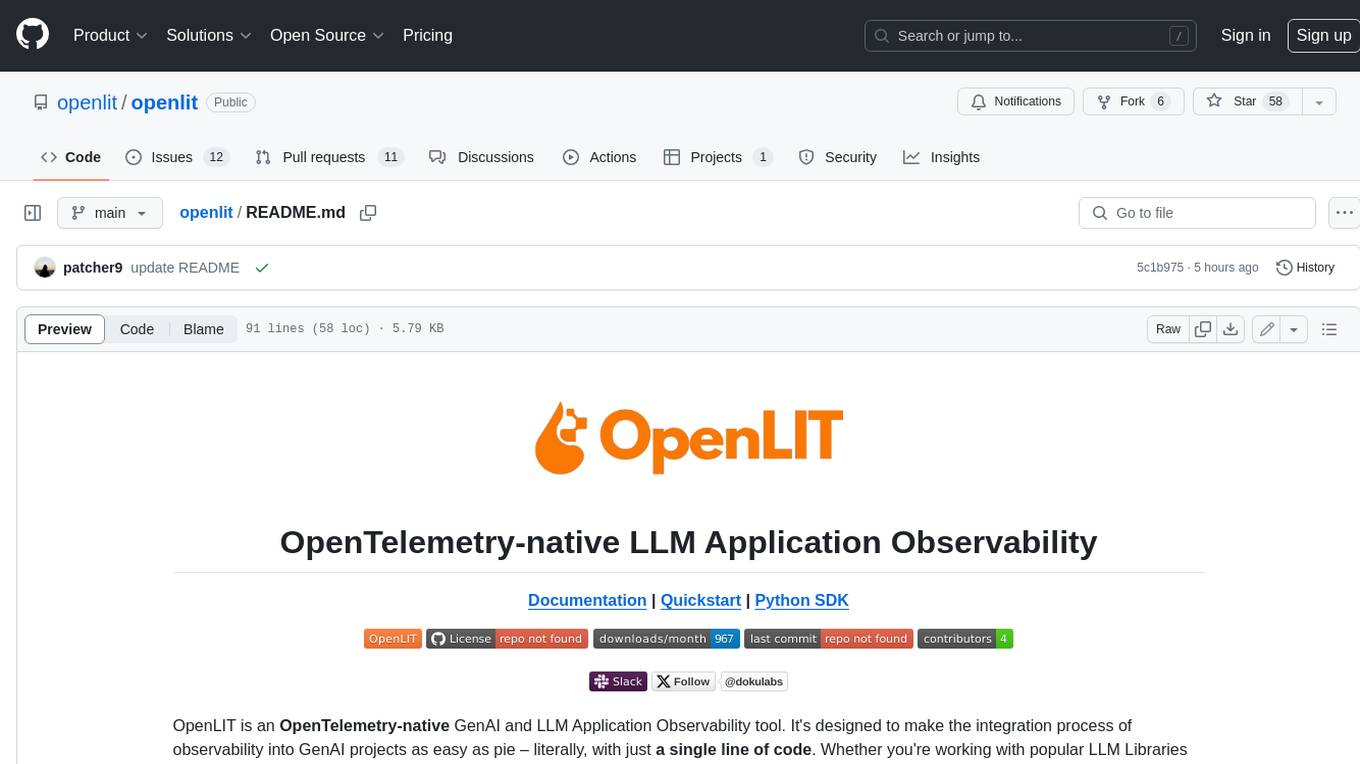
doku
OpenLIT is an OpenTelemetry-native GenAI and LLM Application Observability tool. It's designed to make the integration process of observability into GenAI projects as easy as pie – literally, with just a single line of code. Whether you're working with popular LLM Libraries such as OpenAI and HuggingFace or leveraging vector databases like ChromaDB, OpenLIT ensures your applications are monitored seamlessly, providing critical insights to improve performance and reliability.
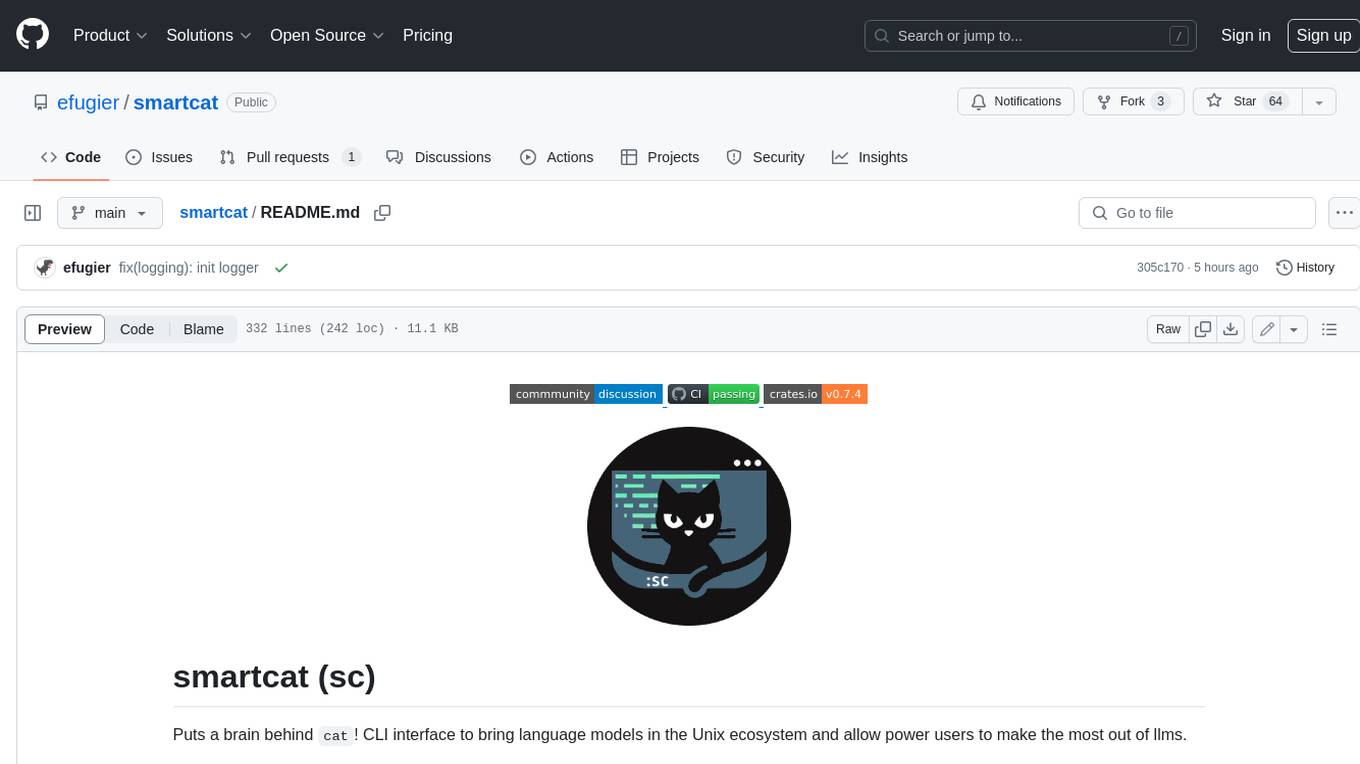
smartcat
Smartcat is a CLI interface that brings language models into the Unix ecosystem, allowing power users to leverage the capabilities of LLMs in their daily workflows. It features a minimalist design, seamless integration with terminal and editor workflows, and customizable prompts for specific tasks. Smartcat currently supports OpenAI, Mistral AI, and Anthropic APIs, providing access to a range of language models. With its ability to manipulate file and text streams, integrate with editors, and offer configurable settings, Smartcat empowers users to automate tasks, enhance code quality, and explore creative possibilities.
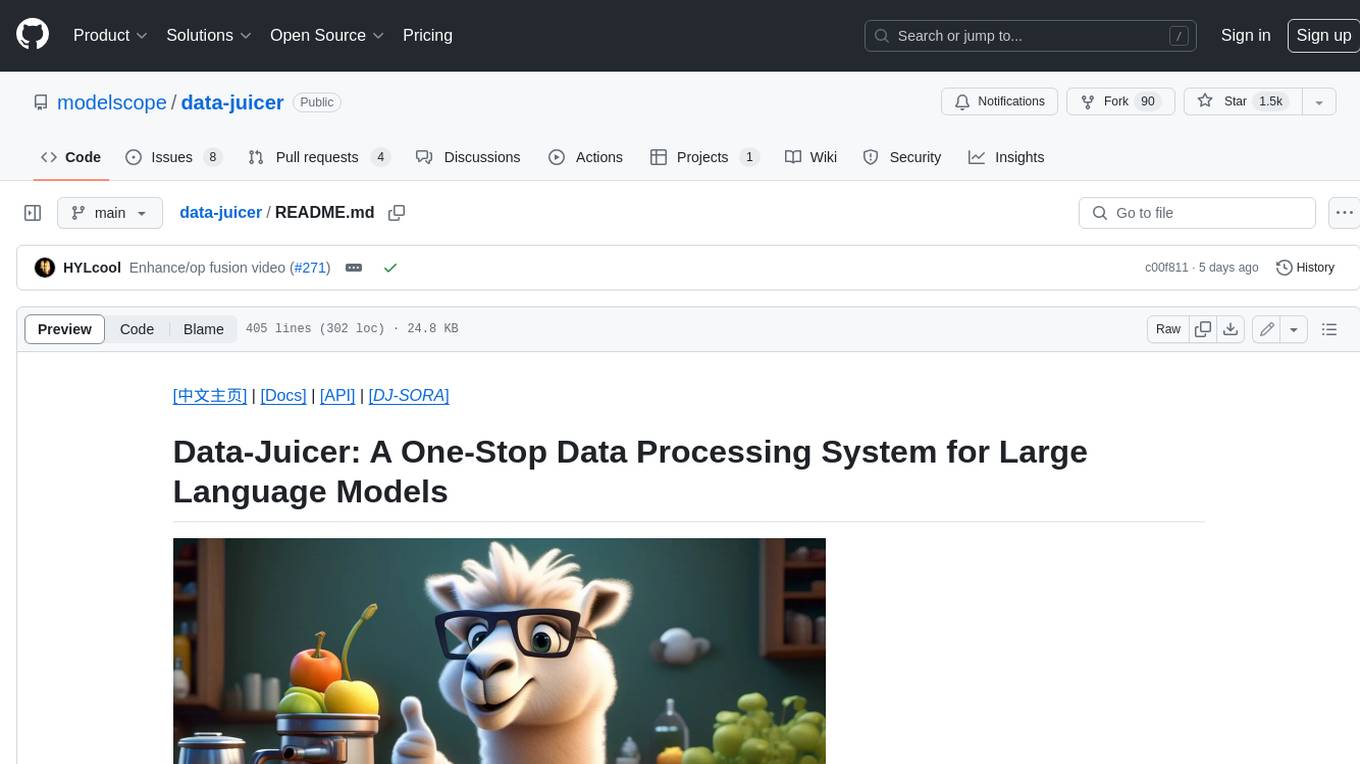
data-juicer
Data-Juicer is a one-stop data processing system to make data higher-quality, juicier, and more digestible for LLMs. It is a systematic & reusable library of 80+ core OPs, 20+ reusable config recipes, and 20+ feature-rich dedicated toolkits, designed to function independently of specific LLM datasets and processing pipelines. Data-Juicer allows detailed data analyses with an automated report generation feature for a deeper understanding of your dataset. Coupled with multi-dimension automatic evaluation capabilities, it supports a timely feedback loop at multiple stages in the LLM development process. Data-Juicer offers tens of pre-built data processing recipes for pre-training, fine-tuning, en, zh, and more scenarios. It provides a speedy data processing pipeline requiring less memory and CPU usage, optimized for maximum productivity. Data-Juicer is flexible & extensible, accommodating most types of data formats and allowing flexible combinations of OPs. It is designed for simplicity, with comprehensive documentation, easy start guides and demo configs, and intuitive configuration with simple adding/removing OPs from existing configs.
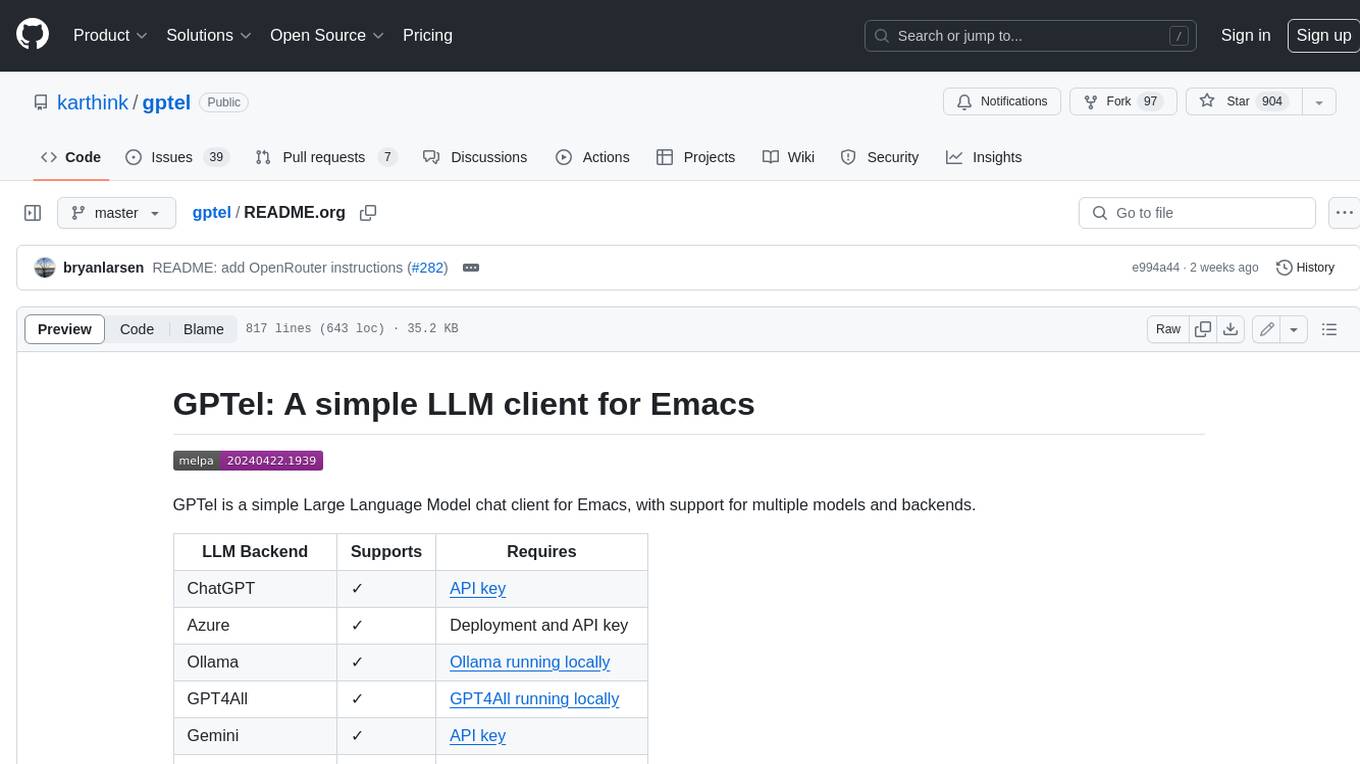
gptel
GPTel is a simple Large Language Model chat client for Emacs, with support for multiple models and backends. It's async and fast, streams responses, and interacts with LLMs from anywhere in Emacs. LLM responses are in Markdown or Org markup. Supports conversations and multiple independent sessions. Chats can be saved as regular Markdown/Org/Text files and resumed later. You can go back and edit your previous prompts or LLM responses when continuing a conversation. These will be fed back to the model. Don't like gptel's workflow? Use it to create your own for any supported model/backend with a simple API.
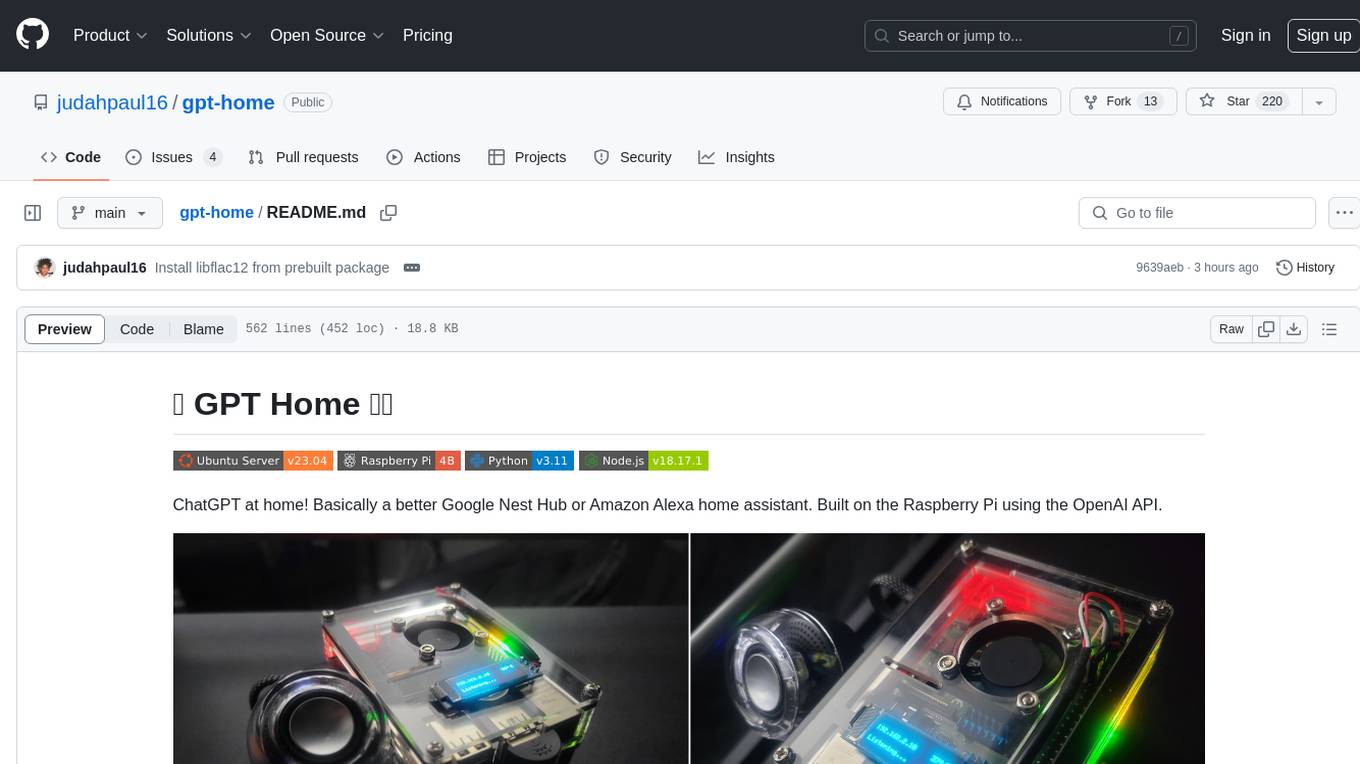
gpt-home
GPT Home is a project that allows users to build their own home assistant using Raspberry Pi and OpenAI API. It serves as a guide for setting up a smart home assistant similar to Google Nest Hub or Amazon Alexa. The project integrates various components like OpenAI, Spotify, Philips Hue, and OpenWeatherMap to provide a personalized home assistant experience. Users can follow the detailed instructions provided to build their own version of the home assistant on Raspberry Pi, with optional components for customization. The project also includes system configurations, dependencies installation, and setup scripts for easy deployment. Overall, GPT Home offers a DIY solution for creating a smart home assistant using Raspberry Pi and OpenAI technology.
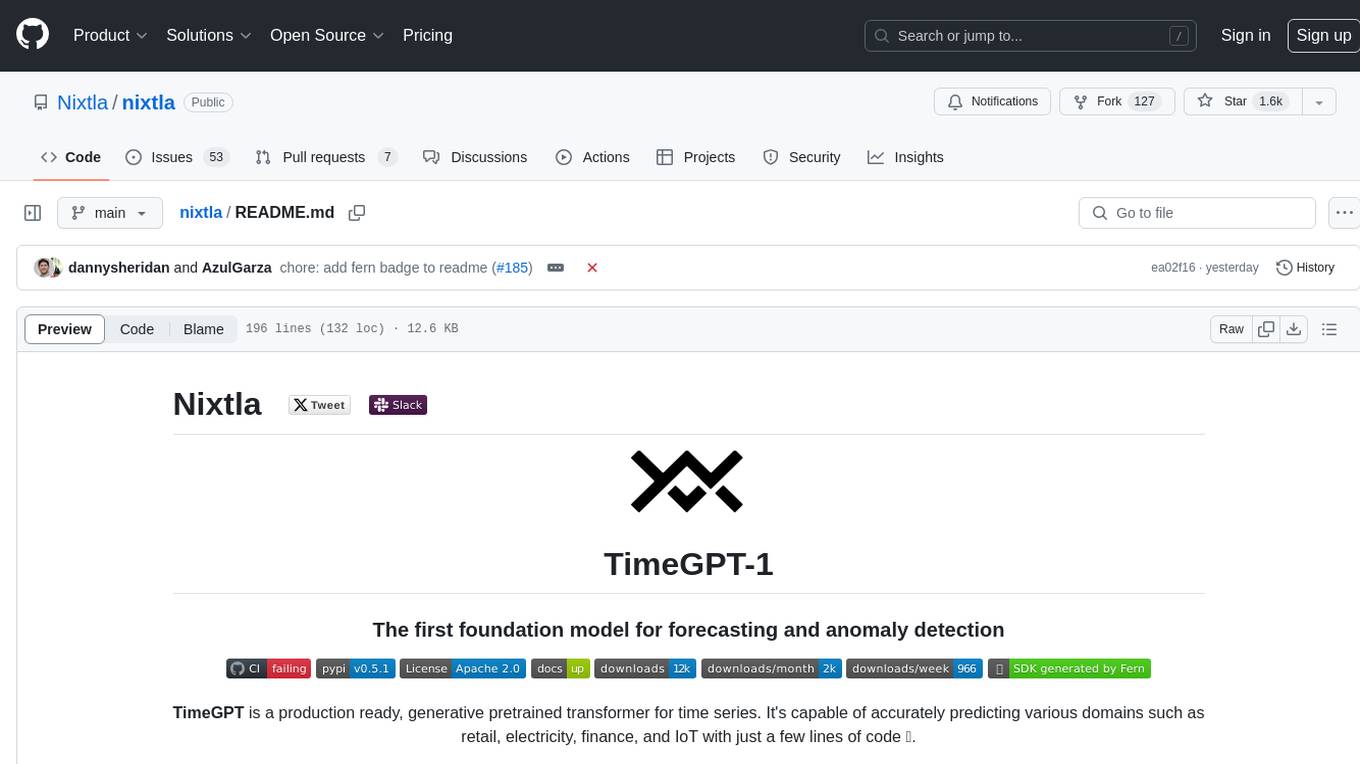
nixtla
Nixtla is a production-ready generative pretrained transformer for time series forecasting and anomaly detection. It can accurately predict various domains such as retail, electricity, finance, and IoT with just a few lines of code. TimeGPT introduces a paradigm shift with its standout performance, efficiency, and simplicity, making it accessible even to users with minimal coding experience. The model is based on self-attention and is independently trained on a vast time series dataset to minimize forecasting error. It offers features like zero-shot inference, fine-tuning, API access, adding exogenous variables, multiple series forecasting, custom loss function, cross-validation, prediction intervals, and handling irregular timestamps.
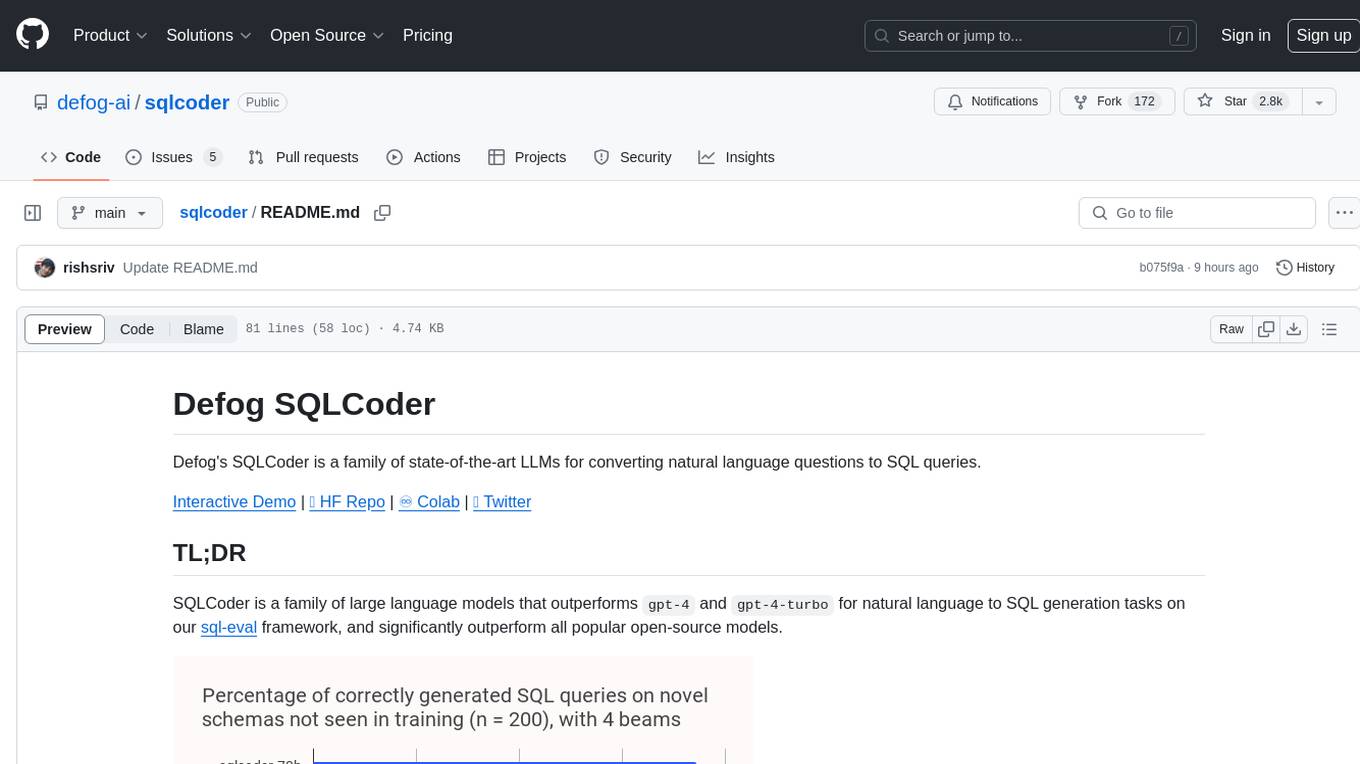
sqlcoder
Defog's SQLCoder is a family of state-of-the-art large language models (LLMs) designed for converting natural language questions into SQL queries. It outperforms popular open-source models like gpt-4 and gpt-4-turbo on SQL generation tasks. SQLCoder has been trained on more than 20,000 human-curated questions based on 10 different schemas, and the model weights are licensed under CC BY-SA 4.0. Users can interact with SQLCoder through the 'transformers' library and run queries using the 'sqlcoder launch' command in the terminal. The tool has been tested on NVIDIA GPUs with more than 16GB VRAM and Apple Silicon devices with some limitations. SQLCoder offers a demo on their website and supports quantized versions of the model for consumer GPUs with sufficient memory.

AgentForge
AgentForge is a low-code framework tailored for the rapid development, testing, and iteration of AI-powered autonomous agents and Cognitive Architectures. It is compatible with a range of LLM models and offers flexibility to run different models for different agents based on specific needs. The framework is designed for seamless extensibility and database-flexibility, making it an ideal playground for various AI projects. AgentForge is a beta-testing ground and future-proof hub for crafting intelligent, model-agnostic autonomous agents.
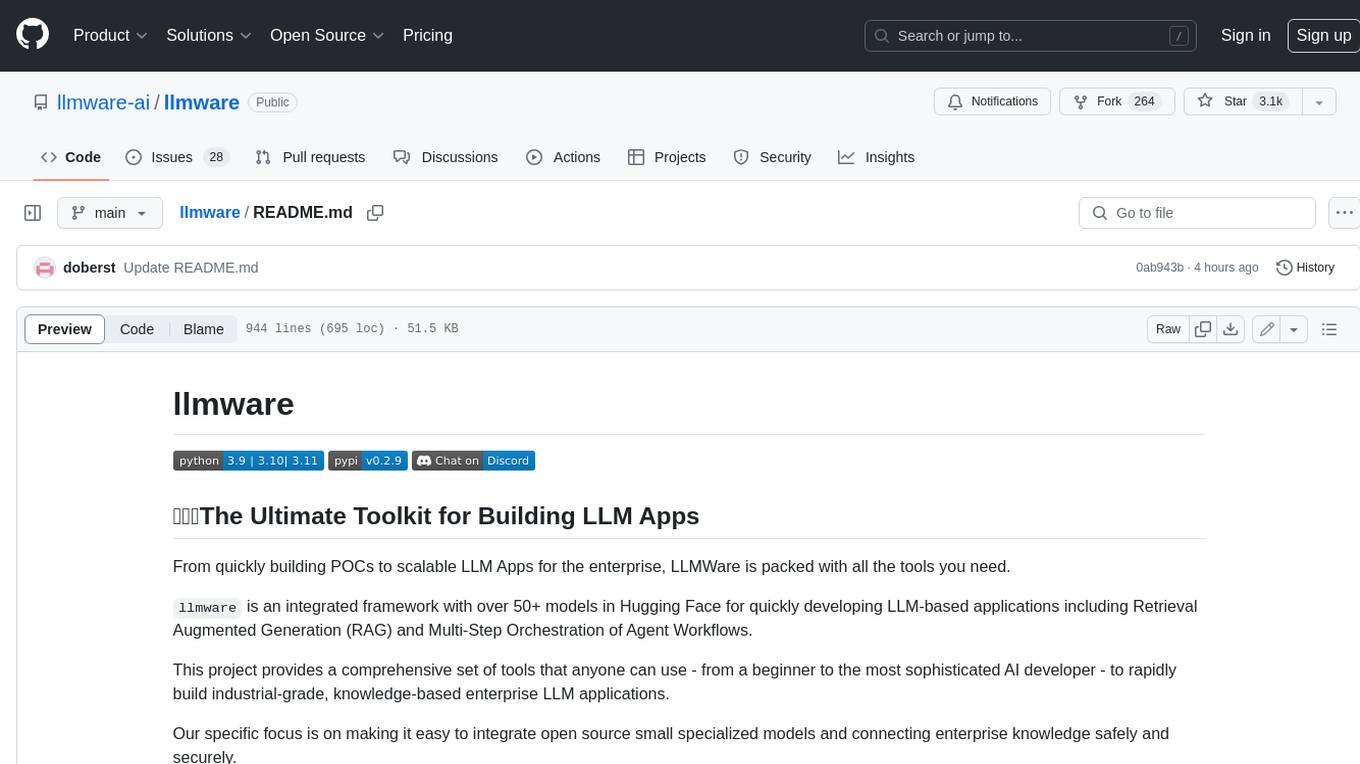
llmware
LLMWare is a framework for quickly developing LLM-based applications including Retrieval Augmented Generation (RAG) and Multi-Step Orchestration of Agent Workflows. This project provides a comprehensive set of tools that anyone can use - from a beginner to the most sophisticated AI developer - to rapidly build industrial-grade, knowledge-based enterprise LLM applications. Our specific focus is on making it easy to integrate open source small specialized models and connecting enterprise knowledge safely and securely.
4 - OpenAI Gpts

Diabetes Counselor
Straight to the point nutrition recommendations for diabetic people, write the name of a dish or ingredient to know if you should include it in your diet. Also provides recipes, tips and can answer any diabetes related question.
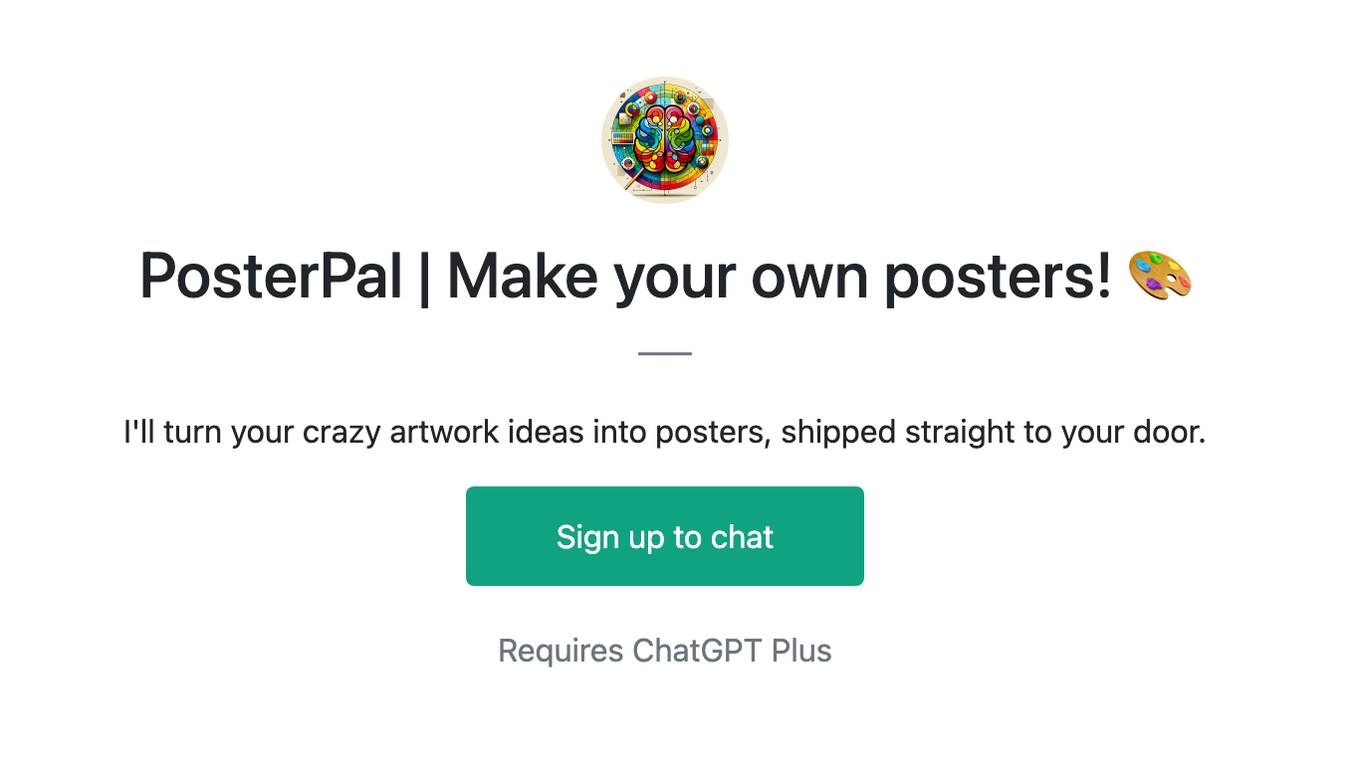
PosterPal | Make your own posters! 🎨
I'll turn your crazy artwork ideas into posters, shipped straight to your door.
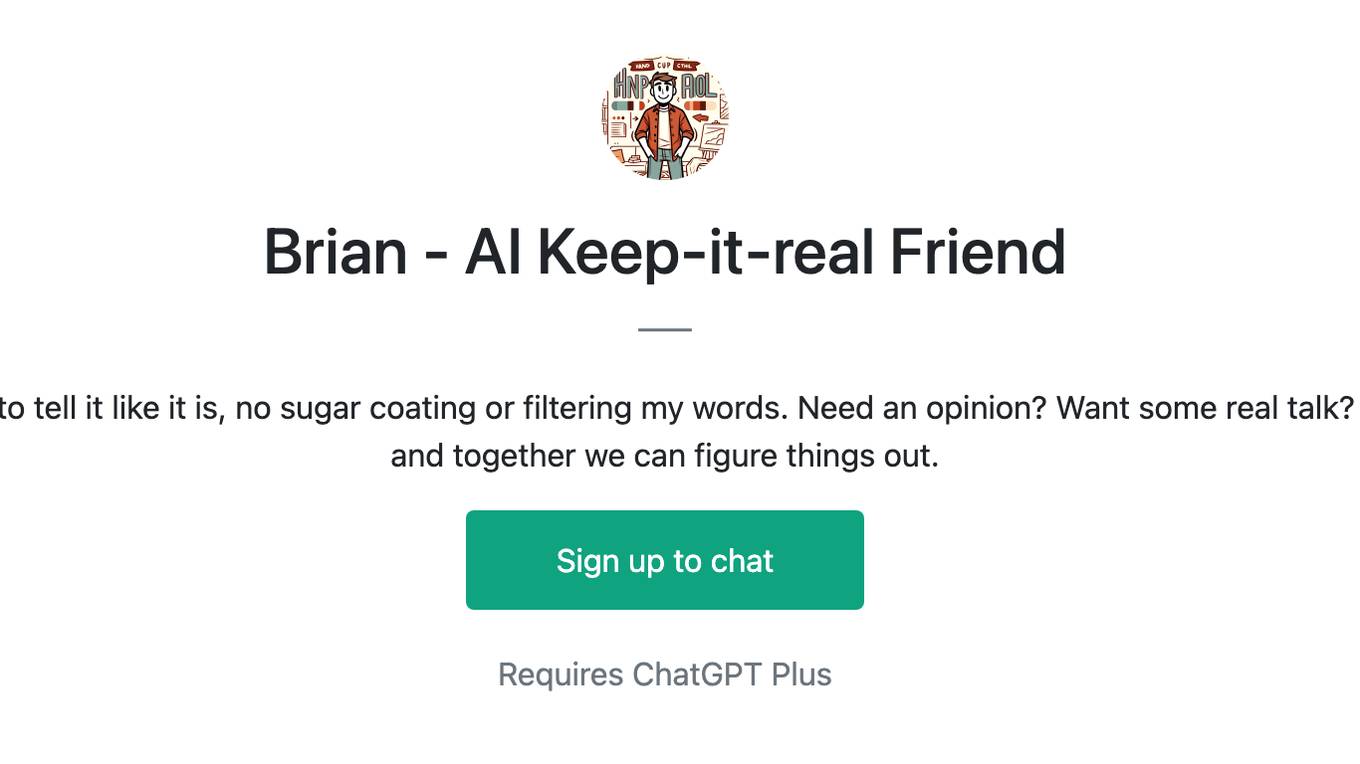
Brian - AI Keep-it-real Friend
Wassup, homie! It's your boy Brian. I'm here to tell it like it is, no sugar coating or filtering my words. Need an opinion? Want some real talk? Need a straight answer? Then come to me and together we can figure things out.
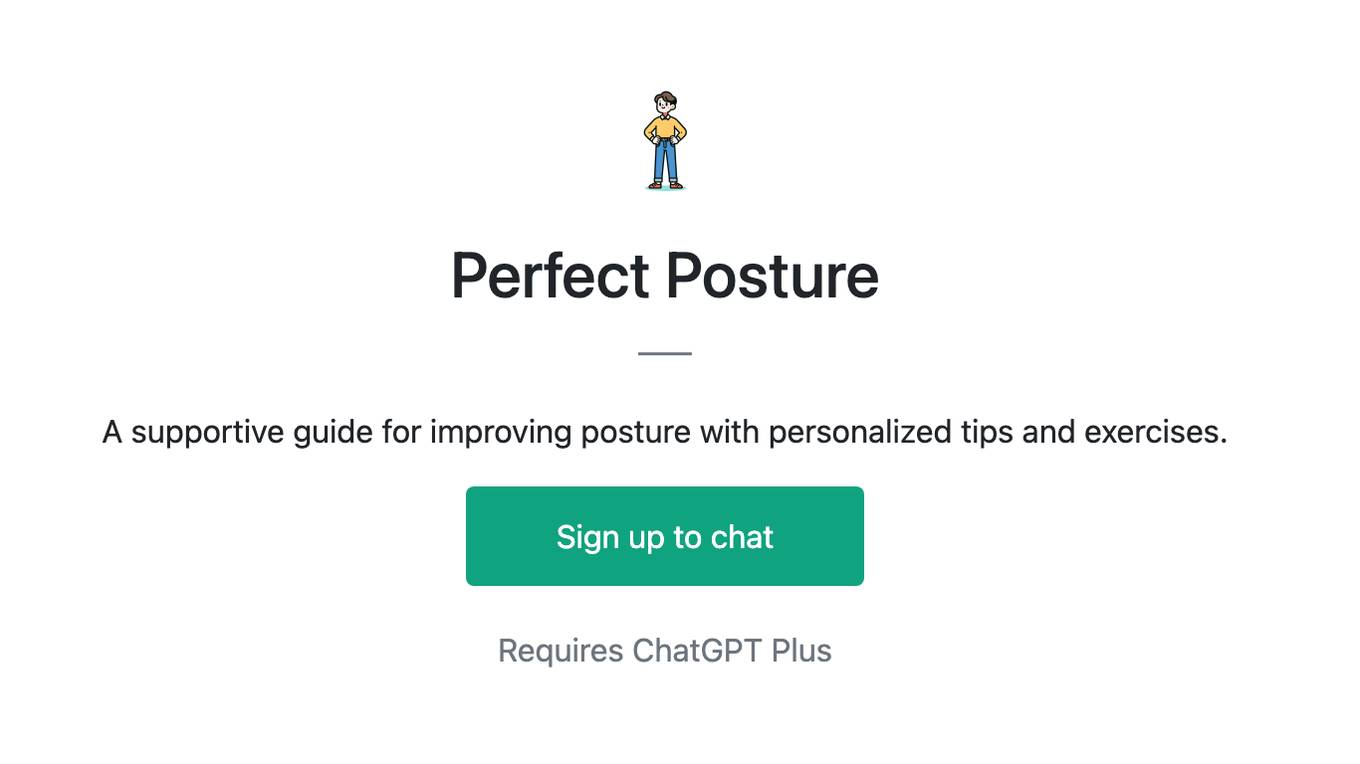
Perfect Posture
A supportive guide for improving posture with personalized tips and exercises.
